#how to preserve history when you are the one who caused it
Explore tagged Tumblr posts
Text
The Ancient Capital bore new scars, ones Pix didn’t remember causing. But he knew enough to know he’d done them. He'd covered the land with skulk and didn’t care what it did to the buildings all around him. Things he had once denounced Cub for causing he had done himself and on a much grander scale.
He knew he'd done it because he'd written it all down in excruciating detail, which made the horrors both very real, and also very dissonant. Somehow, in spite of the possession and the lack of memories, he'd written it all down. And the way he described so much of the skulk infestation made his skin crawl.
It left him feeling conflicted in so many ways. His instincts, his whole drive, was preservation. He'd come here to discover the history of this place, and preserve it for the future. He trod carefully on the earth, and did his best to make sure the past was remembered and preserved accurately. In all things, he strove to keep himself out of history, out of the story. Just be an impartial recorder, rebuilding the past as it had once been, rather than building it the way he might if it was his own base. But he was part of the story now, in spite of himself. And here he was, looking over at the vandalism his actions had caused, and feeling like he couldn't just erase the damage he'd done, even though he didn't want to be reminded of it.
What do you even do in a situation like this? How much do you preserve? What don't you preserve? Clearly the journals he'd made of this event needed to be kept, even when he looked at them, he simply wanted to burn them. He may even make a display for them in the museum once he's decided what to do with the clean-up. He definitely didn't want to keep all the skulk, but he would attempt to record the damage as accurately as possible. That only seemed fair.
Sure, he could blame Cub for getting possessed in the first place, and in his darker moments, he did. But that wasn't fair, because Cub was possessed, and so was he, and while that didn't excuse their actions, it did mean they were both responsible for cleaning up the mess.
It was still strange to think that that last - and very first - meeting with Cub was the thing he remembered most clearly about the whole debacle. He remembered Cub's voice, the acrid smell of the skulk filling his nostrils until he could smell nothing else, the way Cub's bright blue-green eyes filled his vision, and a skulk-covered hand held his head in place, and there was no pain, none at all, but fear gripped him so completely he could not move.
Was it his fault for being infested? Should he have known there was a risk involved in meeting Cub like that? Maybe. Maybe not. But then it was easy to ask these questions now, once it was all done and over with, when he knew the skulk was actually infectious, and not just Cub being weird. In the moment, when he was mostly just concerned about a few (hundred) skulk catalysts, he hadn't even thought that he would get possessed too. And yet, he can't absolve himself of the guilt.
Perhaps it's the journals. Perhaps it's being able to read his own words, in his own hand, as he did the bidding of the skulk and wrote down everything he did for posterity, as he stated many times within the entries. His own strengths were working against him here. His incessant need to document everything was his undoing. Not because no one doubted his possession but because he no longer could. Those journals held him responsible for it all. Sure, Cub did some of the initial work, but what Pix had done was so much more. He'd desecrated his own work, let the skulk spread far further than even Cub dared to go.
But of course it wasn't just the skulk spreading that he had to deal with either. It was the other things he'd written about, like attacking False, plus all the things he'd said to others, people he considered friends, as they'd tried to talk him out of his possession. And he infested False too, even though he didn't remember that. She did, though; not completely, but enough for her to have avoided him ever since Cub and Scar had cured them and taken them back to a mansion to recover. Which he didn't blame him for. He believed her, even if he didn't remember.
He admired Cub's ability to simply move on and make amends. Like being possessed was something he was used to, which perhaps it was. Pix didn't really ask too many questions about the Vex thing, if he was honest. He was mostly just glad they had cured him and False and taken them to safety. He'd attempted to talk to Cub about it, just to see if he had any advice, but he'd lost a big chunk of memory, and Pix didn't want to pry too much, not when Scar was hovering around like a protective partner.
So he was on his own, facing the repercussions of what he'd let happen, with absolutely no idea what to do next. Clean it all up? Erase what he'd done from history? Burn the notebooks so they wouldn't continue to haunt him? No, not even that would erase the callous words he'd written out of his mind. He would remember, even if no one else did.
#hermitcraft#empires smp#fanfic#pixlriffs#cubfan135#falsesymmetry#gtwscar#have some pix angst#how to preserve history when you are the one who caused it#fog - skulk cub fic series
38 notes
·
View notes
Text
I find it so ironically funny when hardcore Debbie defenders use the defense that she was just a victimised teenage girl (agreed) and then proceed to slander Fiona and express their hatred for her character and lack of sympathy
as if being an adult magically absolves an individual of the horrifying trauma that precedes them and screws up their mentality and actions
funnily enough these people get mad at others for "expecting Debbie to be an innocent angel and hating on her for acting out as a result of trauma" (also agreed, debbie does deserve more sympathy, she can't be expected to grow up to be a perfect saint when she's been through so much) yet seem to hold Fiona to the same unattainable standards and put her on a pedestal as if she wasnt a child that was forced to intensely grow up while never actually being raised
like lets put this into perspective and remember that fiona grew up surrounded by corrupt morals and insanely screwed up behaviour yet still emerged as messed up, yes, but surprisingly good considering the situation she was in??? she had to navigate basic things such as morals and being a good, responsible person on her own. imagine how difficult it must be to lead a bunch of kids, including yourself, with no previous role model or good example of your own to follow. most of the time, she always tried to do what she thought was best and would have the most desirable outcome
#listen a lot of the time debbie defenders make good points#is debbie my favourite? no but she does deserve more sympathy#im really unserious on here and ive made some dumb meaningless jokes but at the heart of it i have sympathy for debbie#so no its not the debbie defense i have an issue with#its the way these people claim to be#1 understanders of shameless women and their complexity#top defenders#including of the women who have said and done worse than/just as bad as fiona#and then proceed to spew all this vitriolic lack of sympathy regarding fionas character#they always talk about fiona making the choice to be their legal guardian#as if the situation wasnt complex and 1) she felt pushed into an inescapable corner#2) that doesnt change the fact that she'd have strong feelings about her baby sister choosing to have a whole baby???#she claimed legal guardianship over HER siblings she did not foresee any other children being added to the mix#so yes she went about it harshly at times when she made debbie raise franny independently#but its not surprising considering her exhausted life?? her history as a TEENAGE GIRL and CHILD of raising kids???#there are actual mothers who'd be worse about this situation and fiona wasnt trying to be nasty#it was tough love and it could've been shown in better ways#and im not putting all the blame on debbie cause she was so young and vulnerable#but at the end of the day she made a choice and fiona was trying to help her understand the importance of consequences to your choice#and navigating adulthood when you choose to behave like one#of course debbie was often put in situations where she felt like she had to be a grown up and that is not her fault#but its not fionas either. theyre all just trying to survive. and fiona tried her damn hardest to preserve debbies childhood#so how do you think she'll react realistically to the whiplash of debbie purposefully getting pregnant#ultimately theres a lot of complexity and flaws and nuance to these situations and i find it weird when people criticise#others for putting so much blame on debbie#and then do the same to fiona as if shes not a victimised product of her environment too#you can show sympathy to debbie while understanding Fiona too and being critical in a mature#nuanced way#im not being a hater to anyone btw im just sharing some thoughts and letting it out. all im saying is#most of the shameless women deserve sympathy and understanding and its strange to deny fiona of that
10 notes
·
View notes
Text
Why Aziraphale is completely ridiculous in the Bastille scene (and I love him so much for it)

A while ago I posted a comparison of Aziraphale and Crowley's costumes in the 1793 flashback in Good Omens and I wanted to add these little tidbits. (Because they haunt me.)
I feel like most people know this but IF YOU DON'T, Paris in 1793 is right in the middle of something called La Terreur.

HISTORY LESSON If you didn't learn this in school the French Revolution was when, after years of escalating social tension, a coalition representing the working classes of France revolted against the monarchy, violently overthrew King Louis XVI, and declared France to be a republic.
The new National Convention governing France ruled that King Louis XVI and his wife Marie Antoinette were traitors to the people of France because of how they had spent ridiculous amounts of money on luxuries for themselves while vast numbers of the lower classes were literally starving to death. (keep the bold in mind - wealth and class disparities were one of the key causes of the whole-ass revolution)

In 1793 (year of the flashback) both the King and Queen were executed by guillotine for their crimes.
This kicks of something called The Reign of Terror (La Terreur if you want to be French about it). A multi-year-long period in which the National Convention goes on a bloody witch hunt for any and every member of the middle or upper classes who could even possibly be considered a traitor by those same standards.
If you A) had money or privilege, and B) had ever used your money or privilege to treat yourself, you were getting executed. Over 25,000 people died during the Reign of Terror, half of them by guillotine. In fact, the iconic guillotine was used because it was physically impossible to keep up with the sheer number of people they were executing in Paris every single day.
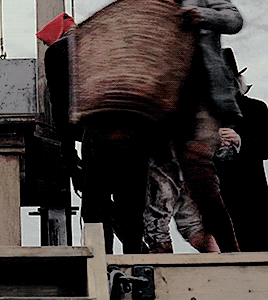
Some things that could get you killed (actually and completely seriously) during the Reign of Terror:
Implying in any way you were sympathetic to the monarchy
Having a noble title
Having expensive things
Wearing expensive, luxurious clothes (*cough* AZIRAPHALE)
helping or sympathizing with anyone who did any of the above
a working-class person saying you were mean to them once
And then there's this bitch...
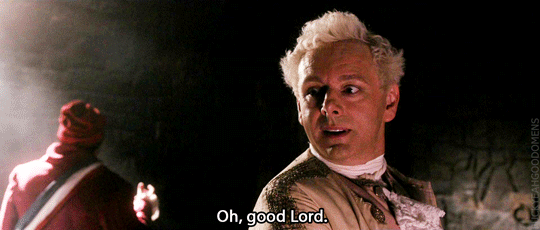
I AM NOBILITY PLEASE KILL ME So we have established that Paris in 1793 is in the middle of a frenzied, state-sanctioned bloodbath in which the working classes are massacring everyone even remotely nobility-adjacent. And in the middle of this frenzy, Aziraphale proceeds to roll up in Paris in this outfit:
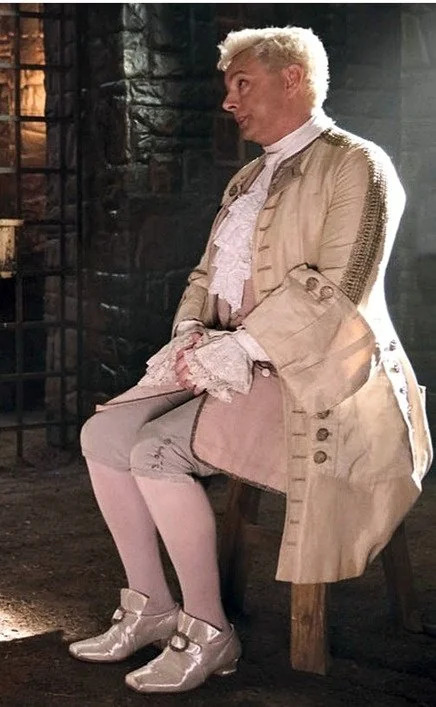
How will this outfit get him killed? Let me count the ways...
First off- at this point everyone with even the tiniest shred of self- preservation is hiding the fact that they are in any way associated with the monarchy. The wealthy are straight-up abandoning mansions. The middle-class are plastering over decorations to make their house look 'poor'. The only people dressed remotely decent are the guys leading the National Convention and that's just because nobody can stop them. Everyone else is in 24/7 peasant cosplay or else they are covering themselves in cockades and sashes on to show they're pro-Republic.
Aziraphale is basically a giant shiny white sign saying I AM NOBILITY PLEASE KILL ME.
First off the lace jabot and lace cuffs are both associated with the old-school wealthy in the 1790's.
His coat is also decorated in gold braid and silver buttons, which are both marks of wealth and luxury.
He basically looks like he works for Louis XIV - not just rich, but old school rich.
We know it's his natural hair color, but hair powdering (with clay and starch) had been a big trend with the rich all throughout the 18th century to get that clean white venerable look . To someone who doesn't know it's natural, it would very much look like he's wearing hair powder.
He's wearing shades of cream and white, which are very hard to keep clean and clearly states that the wearer is rich and can afford the upkeep necessary to keep an outfit like that stain-free.
He's wearing white knee-breeches and stockings, also called culottes. See above about laundry and how rich you had to be to wear white, but also working-class men wore long pants like this:

A large faction involved in the Revolution were the Sans-Culottes (no-culottes aka we wear long pants LIKE GOOD OLD WORKING MEN). Culottes are specifically associated with everything the revolution hated. That's right - Aziraphale is literally wearing The Fanciest of Fancy Pants in a city where a group called The Men Against Fancy Pants are running around murdering people.
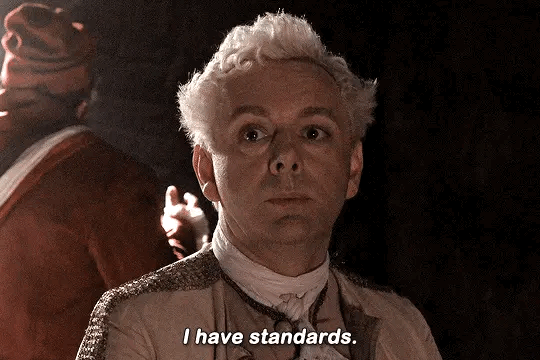
And then there are his shoes.
Oh god his shoes
I could do a whole post about Aziraphale's blessed little white satin pumps and how ridiculous they are.
Actually I might just do that because this is getting so long and I still have to talk about the brioche.
So I can't remember if it's in the script book or if it's from Neil Gaiman's tumblr, but it's apparently canon (?) that Aziraphale was going around in that outfit asking people where he could get crepes and brioche when he was arrested.
The Affair of the Brioches
So... uh... we've all heard the line attributed to Marie Antoinette- how when she was told that her people were starving because there was no bread left in Paris, she famously said...

It's morphed into 'let them eat cake', but the line is first recorded as, "Then let them eat brioches."
While it's unlikely she ever actually said it, the important thing is that... people in 1793 would have thought she said it. It was used as political smear to show how arrogant and out of touch the monarchy was. Marie Antoinette in particular was reviled by the people of France, who thought she was the main cause of their economic problems. That's why she was executed too.
Bread and brioche and the lines between poverty and privilege were a big thing in Revolutionary France. There was a lot of political connotation to what you ate. The French Revolution came about because of decades of suffering among the lower classes of France. It wasn't something that some dudes just decided to do. The people of Paris have been through years of the absolute worst, most oppressive poverty and starvation you can imagine, all while watching the rich throw money around crazy.
So let us recap.
Aziraphale is dressed so ridiculously posh that he looks like a joke parody of a nobleman... and he is bumbling around Paris during the Reign of Terror. Asking people. For brioche. How I imagine everyone looked at him:

It is so astoundingly tone deaf and tactless. He is basically cosplaying as Marie Antoinette and then going around asking the poor for cake.
I just.... Aziraphale. babygirl. no. oh no. You're lucky they even bothered to take you to prison. I am amazed Crowley ever let him live that down.
I have no conclusion other than this. Aziraphale is ridiculous and I love him so much.
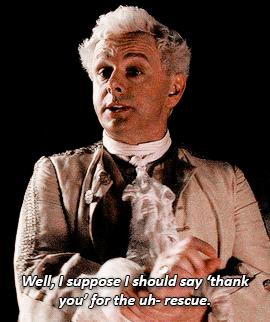
YES YOU REALLY SHOULD SIR.
#good omens#aziraphale#good omens meta#good omens costumes#aziraphale's white satin pumps#ineffable husbands
2K notes
·
View notes
Text
What the heck is going on in Batman/Gotham War?
I know a lot of people in fandom are confused and/or upset about what's been going on in Gotham War - why is Bruce acting like this, what is Selina doing, why are the Batkids taking sides. So I figured I would fill you all in on what's been happening in Batman and Catwoman since Chip Zdarsky took over with Batman #125, because it has been BONKERS and I have been enjoying the hell out of it.
Below, the quickest summary I can manage while still being comprehensive:
[Content warning: mental illness, abuse, suicide (...ish), LOTS of violence.]
The first arc, "Failsafe," starts with Batman and Robin (Tim, in this case) in pursuit of the Penguin, who is on a killing spree. In the very first issue, Tim gets shot in the neck. Bruce has to take him to the hospital, but first he has to strip him out of his costume and put him in civilian clothes to preserve their secret identities, triggering memories of when he had to do the same to Jason's dead body. There is LITERALLY NO PURPOSE TO ANY OF THIS EXCEPT WHUMP (Tim is back in action with a fucking BAND-AID on his neck very quickly), which is how I knew this was going to be good. Beat Tim up! Make Bruce cry about Jason! I want these men to suffer! (There is also SO much to be said about Tim's own Poor Mental Health Decisions throughout the entirety of Zdarsky's run so far, but that's for a separate meta post.)
Anyway. Bruce leaves Tim in the hospital and goes to confront Penguin, who turns out to be dying of mercury poisoning. He kills himself and makes it look like Batman did it, forcing Bruce to flee. (Penguin actually faked his death and is alive elsewhere under an alias, but that's not important right now.)
In the Batcave, a massive robot called Failsafe emerges. Failsafe attacks Bruce, who usually eats killer robots for breakfast, but he can't seem to get the upper hand on this one. Duke, Cass, Steph, and Dick show up to help, but Failsafe beats them all too, while Tim gets an injured Bruce away and to the Batcave.
In the Batcave, Bruce puts on a weird purple and red Batman costume and a new personality takes over: the Batman of Zur-En-Arrh. Now, Zur has a very complicated history going back to 1958, but for the purposes of this story, all you need to know is that when he was younger, Bruce decided it would be good to hang out in a sensory deprivation chamber until his mind created a secondary personality, Zur, who is essentially Batman without Bruce. Zur is pure efficiency who does not care about anything but the mission. He created Failsafe, for one purpose: to kill Bruce if Bruce ever crossed the line and killed someone. And right now, Failsafe believes that Bruce killed Penguin.
Failsafe nearly kills Tim, which Zur is okay with writing off as an expendable soldier's death, but this causes Bruce to take control of the body back because "Tim isn't my soldier...HE'S MY SON!" (Tim Nation, why are you not ALL OVER this story? It's catnip.)
Babs calls in the JLA (SuperBat fans, you will also want to read Bruce's adoring description of Clark when he shows up), but of course Failsafe has kryptonite, which it stabs Clark with. The League dumps Clark and Bruce into the JLA jet and distracts Failsafe while Tim flies Clark and Bruce to the Fortress of Solitude. Bruce tells Tim he's a good boy and jumps out of the jet and into the ocean so that Tim and Clark will be safe from Failsafe. He's rescued by Arthur, who takes him to Atlantis to heal. THIS HAS ALL ONLY BEEN FOUR ISSUES SO FAR.
Two weeks later, Bruce wakes up to discover that Failsafe has taken over Gotham. He teleports up to the JLA Watchtower on the moon to lure Failsafe there, then blows the Watchtower up, hoping to catch a ride on one of the Javelins. But Failsafe has already destroyed them, so Bruce RIDES A BOOSTER ROCKET BACK TO EARTH, OXYGEN MASK CLAPPED OVER HIS FACE. The whole thing has some powerful Scooty-Puff Jr energy.
The only tricky part is reentry, when Bruce starts to burn up - his costume is fireproof, of course, but his chin is exposed. SO HE TAKES OFF HIS LITTLE BAT-PANTIES AND PUTS THEM OVER HIS HEAD. I swear to god this happened in a real comic book and the entire "Bruce falls off the moon and survives" sequence is utterly delectable goofy nonsense and I truly cannot recall a time I've had more fun reading a comic book.
Anyway, Bruce lands directly outside of the Fortress, BECAUSE OF COURSE HE DOES, and runs inside to find Clark and Tim. While Clark keeps Failsafe distracted, Bruce and Tim program nanobots to inject compassion into Failsafe. I SWEAR TO GOD. They zap him with the nanobots, but Failsafe pulls a high tech space gun out of the Fortress and shoots Bruce with it anyway, apparently disintegrating him. Tim falls to his knees in the snow, weeping. TIM NATION, WAKE UP, THIS RUN IS CANDY FOR YOU.
But of course Bruce isn't dead! That wasn't a killing gun, it was a "zap you into another dimension" gun!!! THAT was the compassion!
So Bruce finds himself in a dystopian alternate Gotham, and I'll be honest, I didn't love this arc ("The Bat-Man of Gotham") as much as I loved "Failsafe," but it has its moments. In this Gotham, Bruce Wayne is dead, so Regular Bruce is like "Oh boy, time to Batman this place up." Also he's plagued by hallucinations of a skeleton version of Jim Gordon who is still wearing a trench coat AND A MUSTACHE. Like I said, it has its moments.
This Gotham is controlled by Arkham, and anyone who is diagnosed as "crazy" is locked up. A new villain, Red Mask, is in charge, and Selina and a Venomed-up Harvey Dent work for him. Bruce teams up with an orphan kid (of course) named Jewel and goes after Red Mask, who turns out to be some guy named Darwin Halliday and ALSO...the Joker. Well, he's the Joker who hasn't been Jokerized yet. But one time he breathed in some chemicals that let him see into the main reality of the DCU (???) and glimpsed Regular Joker and now he wants to build an interdimensional machine to mentally connect with Regular Joker across universes which he assumes will make him insane, NATURALLY.
Bruce attacks Red Mask, who sics a Venomed-up Ghost Maker on him. Ghost Maker cuts off Bruce's right hand. Bruce cauterizes it with an electroshock machine and ties some spikes on it (SERIOUSLY) and goes after Red Mask again. Meanwhile Red Mask mentally connects with an alternate dimensional Joker...but instead of it driving Red Mask insane, he's what drives the Joker insane. Desperate to become the Joker somehow, anyhow, he jumps into the interdimensional portal, and Morally Dubious Alternate Universe Selina kicks Bruce in after him.
Meanwhile, Tim is in full "I KNOW I SAW HIM DIE BUT HE'S NOT DEAD" mode, which: bless. So he teams up with Jon Kent, which...gosh, what an astonishingly boring duo. I love Jon, I love Tim, they're perfectly nice and normal around each other, I'm falling asleep. Anyway Tim fights Toyman for a while and then makes a VERY stupid costume where the entire torso is a giant light-up R, because "I want him to see that Robin is coming to save him." GET A THERAPY, TIM.
Bruce finds himself first in the Michael Keaton Batman universe, then the Red Rain universe, BTAS, Batman Beyond (yes I know they're the same universe but I guess he goes there twice), Silver Age, Kingdom Come, Gotham by Gaslight, and more. Adam West gives him a utility belt. The Dark Knight Returns Bruce builds him a robot hand.
Finally Bruce and Red Mask reach the end of the multiverse, which is a Gotham asteroid floating in space, surrounded by giant Jokerized sharks. LUCKILY BRUCE HAS BAT-SHARK REPELLANT IN HIS ADAM WEST UTILITY BELT!!! Honestly this whole arc was worth it for that moment.
Bruce knocks Red Mask out, but now he's stuck. He has a device from Batman Beyond Bruce to get home, but it's only good for one person, and he can't leave Red Mask there to die. Of course, that's when Tim shows up in his stupid giant glowing R costume and they hug it out, thereby fulfilling but also compounding all of Tim's issues since 1989.
Anyway things are fine now, right? Sure, Bruce is hallucinating that his family is on fire, and the Zur personality is not going neatly back into the box where it's been all these years, and he still has a robot hand (Damian, hilariously, immediately announces that he wants one too), but he's FINE. He is a little bit mad at Selina, because she broke out of jail (she was in jail because she killed her fuckbuddy because he was trying to kill Bruce), and also because she didn't tell him Penguin was alive and that would have stopped Failsafe, and also because Other Selina kicked into another universe. Selina, very fairly, is like "Well I'm not responsible for Other Selinas and also maybe don't build robots to kill yourself with and not tell anyone about them???"
THEN we got Knight Terrors, the summer event in which a villain called Nightmare caused everyone to fall asleep and, uh, have nightmares. Bruce, specifically, had a nightmare that he met an eight-year-old version of himself that vomited up a man-sized bat with a gun for a head. I laughed SO HARD. Bruce also had his body borrowed by Deadman for the duration of the event, so while he endured the psychological toll of nightmares like everyone else, he also endured the physical toll of everything Deadman was doing PLUS the mental toll of being aware of what was happening in the waking world even though he couldn't control his body. As soon as the event was over, he lapsed into a coma so that his body could get some damn rest.
Okay. Now we're up to Gotham War.
(I know, I know. But for all of you who are like "How could Bruce do this???" about Gotham War...*points up* THAT'S HOW. HE IS NOT WELL.)
Bruce awakens from his coma and IMMEDIATELY decides to Fight A Crime even though Babs is like "Maybe don't?" But he can't find any crime, which is...weird. His kids confirm that Gotham's been super quiet since he's been out.
Selina hears that Bruce is awake and is like okay, time to pay the piper. She calls all of the Bats to a meeting and explains that she's the reason crime has been down. See, villains like Joker and Two-Face always have goons, right? But what if the goon supply dried up because the goons have better jobs? So Selina has trained All The Goons In Gotham to be...cat burglars. No violence, no stealing from anyone who can't afford it. More importantly, no helping Scarecrow or whoever commit mass murder.
All of the Batkids are like "Hmm...I feel uncertain about this, but it's working...I don't know what to think..." except for Jason, who thinks it's hilarious and is instantly Team Selina, and Damian, who is staunchly Team Bruce. Bruce, meanwhile, is like "No! NO! THIS IS CRIMES, AND CRIMES IS BAD!" and Selina's like "I mean, robbing from the rich is basically a victimless crime" and Bruce screams, I swear to god, "MY PARENTS WERE 'RICH'!" Inexplicable scare quotes and all. I laughed so hard.
Anyway this is the basis for Gotham War and it is endlessly hilarious to me because everyone in the Batfamily is supposed to be a genius and yet not one single character has pointed out that:
There are jobs the goons could be doing that AREN'T illegal. It's not just violent crime vs. nonviolent crime. There are in fact many other jobs! I am POSITIVE Gotham needs construction workers and hospital orderlies. (Yes, I know it's hard for people with records to get jobs. That isn't addressed.)
Being Batman is SUPER ILLEGAL.
They are all so stupid.
Selina's plan doesn't even work, because one of her thieves gets killed by a rich person defending their home, and Bruce is like "See? This is why crime is bad!" and like...pretty much snaps. He's particularly fixated on Jason, even (rhetorically) threatening to kill him, which is when the other kids jump into the fray on Jason's side, all except for Damian, who like I said is firmly Team Bruce. (This makes complete sense to me, Damian has been dealing with severe trauma and isolation pretty much nonstop since 2018 and he and Bruce have finally made a tenuous peace, so I can understand why he wouldn't want to lose that.)
Also, Vandal Savage buys Wayne Manor. It's so random and SO funny.
OKAY BATMAN #138. Bruce has kidnapped Jason and injected him with a variation on fear toxin which will be triggered whenever Jason's adrenaline spikes, the idea being that Jason is no longer capable of killing - but in practice, Jason is no longer capable of even getting up off the floor, he's so terrified. I want to be really, really clear here: Bruce is like 90% Zur here, and the only reason he goes this route and doesn't kill Jason is because the remaining 10% that's still Bruce loves Jason and is trying to help him. He's just incapable of good or humane help because Zur literally can't do feelings.
Dick knows something is up and is sneaking around Bruce's Secret Other House We've Never Heard Of to figure out what it is. Damian attacks him to protect Bruce. Tim attacks Damian so that Dick can do what he needs to do, and handcuffs Damian to a parking meter:
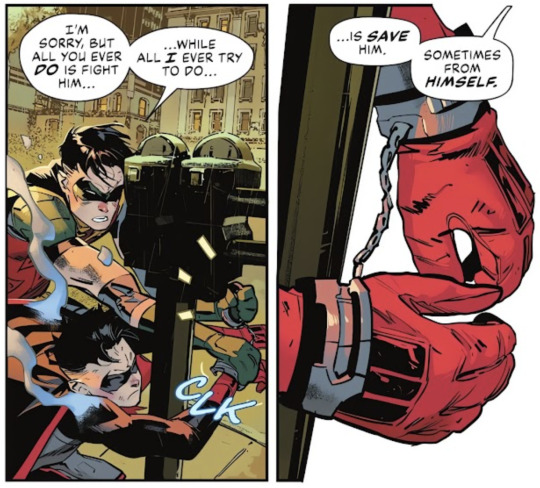
THERE IS SO MUCH TO UNPACK HERE!!! TIM GO TO THERAPY! DAMIAN GO TO THERAPY! EVERYONE GO TO THERAPY!!!!!
Dick figures out what Bruce did to Jason (it's on the computer, for...some reason?) and absolutely loses his shit on Bruce, beating the crap out of him, which tbh is the only thing that felt off to me in this run because frankly I don't think Dick likes Jason that much. BUT WHATEVER.
Tim pulls Dick off of Bruce. Bruce leaves them both tangled in a net and flees as the cops approach. Zur's like "Good, fuck 'em" in Bruce's head, because the cops will expose Dick, Tim, and Damian's secret identities and Bruce will be free of the dead weight of a family, but the little bit of Bruce still in there throws Dick a batarang so he can free them all in time.
Then Bruce leaves. Damian is devastated.
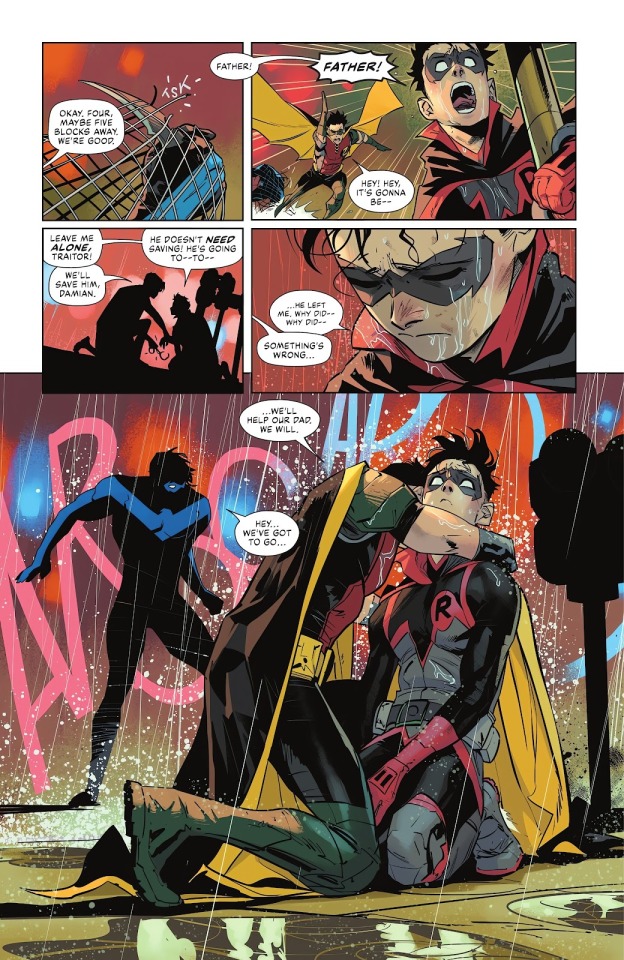
I WILL NEVER RECOVER FROM THIS PAGE. Damian really thought he could have Bruce's love and loyalty if he turned on everyone else! Tim is going to be a therapy dog to a Wayne even if he has to settle for the one he doesn't like! That unresisting, blank hug made me SCREAM when I turned the page. Incredible. (Also the art fucking S L A P S, god bless you Jorge Jimenez.)
ALSO it turns out that Selina's second in command has been Vandal Savage's daughter Scandal Savage the whole time and they are turning Selina's cat burglar army into their own personal army WHOOPS. (This also feels very OOC for Scandal but at this point I trust Zdarsky with my life so let's see where things go.)
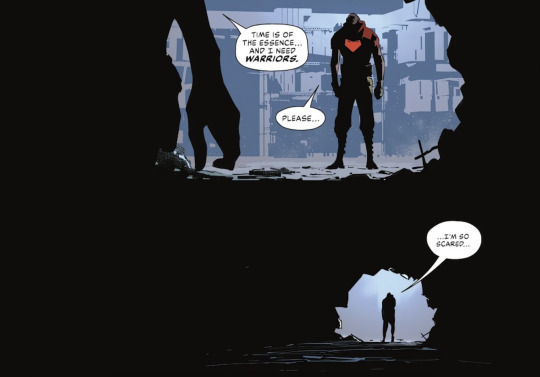
SO THAT'S WHAT'S GOING ON IN GOTHAM WAR. TL;DR:
Bruce is unhinged because he nearly died like 19 times in a week and it unlocked the smaller, meaner purple Batman that lives inside him.
Selina is unaware that you can get money legally.
Tim is going to have a nervous breakdown if he can't fix someone, ANYONE.
Damian needs a hug but ideally from someone he actually likes this time.
Jason is so scared.
THE END.
2K notes
·
View notes
Text
This was a reply to someone else, but I'm making this its own post because so many people are being so evil right now re: Noah Schnapp.
You can find other, longer explanations with history and all, but all the places I've seen more or less agree with this:
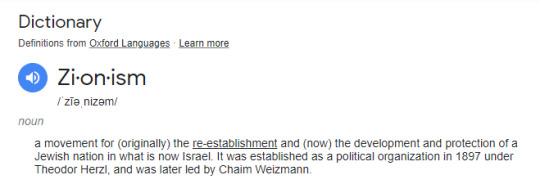
So you're all calling people to cancel Noah because he's in favor of a Jewish nation in what is today Israel. Which is a perfectly reasonable, decent and educated opinion to have, especially when you, to use a trendy term, "educate yourself" and find out why the state of Israel was created.
11000 dead Palestinians, half of them children
According to Hamas. Don't forget that, ever. They're the current, official government of Gaza, thus they're the ones who give numbers. This means that the real number could be 10, 1 million, anything in between. What I've read is that they probably give more of less accurate total numbers. What they fail to do, however, is distinguish between Hamas militants and civilians, and beteween civilians killed by IDF strikes, civilians killed by failed Hamas or Palestininan Islamic Jihad's rockets (which happens a lot), and Palestinians murdered by Hamas/PIJ (which also happens, a whole damn lot). They also don't specify how many civilians they have prevented or tried to prevent from evacuating or receiving aid.
11k dead people is a horrible number. Even 1 dead person is a horrible number. However, urban warfare in such a densely populated area is its own kind of hell, especially when the other side is fond of using civilians as human shields in every way possible. The fact that the number is 11k and not 50k, 100k, and so on, indicates that the IDF have indeed done a lot to minimize deaths. You don't genocide people by doing roof knocks, opening evacuation lines, dropping guided bombs, putting up an Iron Dome to deal with rockets while avoiding escalation, etc. simply because actual genocide, while a lot worse, is also cheaper, easier and faster than what they're doing. This is important because caling every act of war genocide dilutes the word, and there are actual genocides happening around the world. Also, there is a difference between striking military targets and causing civilian deaths as a side effect (what the IDF is doing) and planning and carrying out a massacre deliberately targeting civilians and inflicting as much pain and humilliation as possible on them. And there is a difference between doing so by breaking a ceasefire (which is what Hamas did), and defending your country because if you don't do that a terrorist group will anhilate you (which is what the IDF is doing).
Back to Noah. So far, these are the things that people have tried to cancel him for:
Traveling to Israel (a completely normal thing)
Having Israeli friends (another completely normal thing)
Condemning Hamas' horrible attack on October 7th (the decent thing to do)
Posting a statement saying he feels unsafe as a Jewish person in the US (which, given the rise of antisemitic acts in the world, including the US, including where he lives and where he studies, is a valid feeling to have)
Signing a letter, along with Shawn Levy, Brett Gelman, Ross Duffer and I think Cara Buono, asking Biden to press for the liberation of every hostage by Hamas. This especially shows the utter ignorance of the cancellers because, as it turns out, caring about every hostage implies a slowdown of IDF's actions (and, at the time, a delay of a ground invasion).
Supporting the existence and preservation of the state of Israel (once again, a completely normal thing). The fact that people are turning against him for these things says to me that the real reason you are all hating Noah is beacuse:
He's Jewish. Like, really really Jewish.
And the fact that this all comes from a place of antisemitism isn't hidden at all: I've seen y'all on here, on Twitter, Reddit, every other social media calling him slurs (such as "cunt"), censoring his name, pretending he's not part of the cast, asking the Duffers/Netflix to fire him, wishing him failure, doxxing him, calling on his classmates to physically assault him, etc. He doesn't need to educate himself: you guys are already teaching him a great lesson on why a Jewish state is necessary. If that's the treament he gets from his own "fans", what can he expect from the world at large?
#byler#noah schnapp#antisemitism#jumblr#stranger things#i know many people here are actual children or college students#who have never lived war or armed conflict#and this is baby's first social justice fight#but the way you're acting towards Noah is disgusting and evil#I'm not even jewish but I know what terrorism is like#and I know what it's like to have idiot 1st worlders be on the terrorists' side because they think they're “liberators” or something#harming the very people you think they help
900 notes
·
View notes
Text
Awake
❝commission: a oneshot that explores the relationship between y/n and some of the generals and or soldiers. I'm personally torn between a 'Cleitus wakes up' fic. — requested by 💻 anon.
❝ �� — lady l: I can't tell if I find this cute or distressing, maybe both? I hope you like it and forgive me for any mistakes! 🩶
❝tw: slight angst.
❝word count: 1,670.
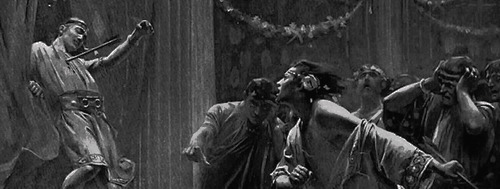

It was noisy outside. The soldiers’ voices mingled in a hubbub of conversation, loud laughter, and the sound of clinking glasses; the celebration seemed to grow longer with each passing second, like a wave of rising energy. The tumult could be heard for miles around, for this was a night of celebration — a rare occasion in wartime when everyone had a common reason to celebrate.
Cleitus was alive. Against all odds, even after Alexander's merciless attack, the man had held on. Wounded and exhausted, he now lay in the shadows of the medical tent, the smell of medicinal herbs and aged fabrics permeating the heavy air. It was there, under the care of the King’s own trusted physician, under your care, that he was recovering, his body still vulnerable but his spirit preserved — and, even though unconscious, life pulsed faintly but presently through his veins.
And it was all thanks to you. No one understood exactly how it had happened; how, amidst the chaos and bloodshed, you had managed to save Cleitus. Murmurs of your daring and skill circulated among the soldiers and servants, shrouded in awe and distrust. But the fact was undeniable: he was alive, despite the dire predictions. Although he had not yet regained consciousness, the mere fact that he was breathing was cause enough for celebration.
But while the others celebrated, you remained motionless, sitting in the shadows of the tent, facing the cot where Cleitus rested. The darkness seemed to taper around you, filled only by the regular, fragile sound of his breathing. It was as if a current of anguish was rising through your body, slow and relentless, squeezing your heart with invisible fingers.
He was safe, yes. You had saved him and you knew it. But then, why was there that weight on your conscience, that nagging feeling that something terrible had been done? The memories of history hammered at your mind, insistent. From what you knew, Cleitus should have died at the hands of Alexander. His fate was death that night, a tragic and inevitable part of history. But now everything was changed. You had interfered, diverted the course of time — the natural balance of things had been disrupted.
And it wasn’t just any life you had spared. It was Cleitus, a man who, despite his outward toughness, carried an immense loyalty to the king and, in a way, to you as well. He had stood up for you, protecting you in a situation that would undoubtedly cost you dearly. For that reason, you simply couldn’t allow them to let him die. He was more than just a historical figure to you; he was someone you had learned to respect and consider a friend.
The dilemma seemed to pierce your soul. How could you allow history to take its course, letting someone who was important to you be killed in such a brutal and cruel way?
You couldn't.
It was strange to think about it: history itself had already begun to distort itself before you saved Cleitus, before each of your interventions. Alexander shouldn't have cared about you, much less "proposed" a union that would seal your presence with him forever. It was an unthinkable, dangerous idea that was already altering the course of things.
So where was the real weight of your guilt? Was there any point in questioning your interference now, when that whole era was far from how you knew it from the books? Perhaps Cleitus's destiny had already been changed from the first moment you arrived, from the first look Alexander had given you with an indomitable gleam in his eyes. Perhaps he was saved not only by your hands, but by a new destiny that both of you were creating every day.
Or perhaps it was the work of some sadistic god.
It was no secret that there were rumors in the camp. Whispers ran through the hallways of the tents, escaped from the campfires, were whispered among the soldiers, servants, and slaves. They admired what you had done. In their eyes, you were no longer a foreigner, a barbarian, who had appeared out of nowhere; you were the woman who had faced your own fate to save Cleitus. A feat worthy of honor, worthy of respect.
These men, so accustomed to the brutality of battle, who saw death as an inevitable companion, now looked at you with a mixture of awe and reverence. It was as if, in a single action, you had earned everyone's respect, an almost heroic figure to those who, not long ago, didn't even know your name.
But this admiration only deepened the knot in your chest. What they saw as heroism, you saw as a mistake, a misstep that could trigger unimaginable consequences.
"(Y/N)?" The hoarse, slurred voice cut through the silence, bringing you back to the present like a blow of reality. Your heart skipped a beat, and your eyes widened as they fixed on Cleitus's figure.
He was awake.
Still pale and visibly weak, Cleitus half-opened his eyes with effort, blinking a few times as if trying to adjust to the soft light that filtered through the sides of the tent. There was a vague confusion in his gaze, a mixture of pain and astonishment. It was clear that he was still recovering, the features of his face carrying the exhaustion of someone who had fought between life and death.
For a moment, you stood paralyzed, unable to find words, while he tried to focus his vision on you. Each second seemed like an entire universe, filled with emotions that you could barely name.
"I..." Your mouth went dry and you shook your head. You didn’t know what to say, what to feel.
Cleitus, his expression grim, tried to stand up, but the movement made his entire body protest. A low groan escaped his lips, his face contorting as he pressed a hand to the wound. Still closed and bandaged, but far from healed, the pain was still a vivid reminder of the attack by the man he admired.
"Don't strain yourself, Cleitus." You murmured, almost without realizing it, instinctively reaching out to grab his shoulder and stop him from moving any further. Your touch seemed to calm him, and he relaxed back against the cot, the muscles in his face softening slightly as he tried to catch his breath.
Cleitus's dark eyes locked with yours, a silent, contemplative weight in his gaze. He sighed, a long, weary sound, as the fragments of the past rearranged themselves in his mind, forming the painful mosaic of that fateful night. The banquet, the laughter, the lively conversations, the rich and fragrant food, the unexpected announcement of the wedding... And then, the chaos. The violent attack, the betrayal that had almost cost him his life.
Cleitus frowned, his eyebrows drawing together in an expression of sincere concern as he studied your face. "Are you okay?" His voice, still weak, carried a concern that made him ignore his own pain for a moment. Even after everything he had suffered, there he was, worrying about you.
The question took you by surprise. He, who had almost lost his life, was there asking if you were okay. For a moment, you wanted to laugh, perhaps to ease the weight of the situation, but the sound got stuck in your throat.
"I..." You hesitated, trying to find an answer that didn’t sound absurd. It was a simple question, but it seemed to carry all the weight of the guilt and doubts that hammered in your mind. You had defied fate, broken the lines of what was supposed to happen and, in a way, you were feeling lost amidst the whirlwind of consequences. And now, with Cleitus looking directly into your eyes, this barrier of defense seemed increasingly fragile.
"I... Just wanted to make sure you were okay." You finally said, your voice barely above a whisper.
He stared at you for a few more moments, absorbing your words, and then nodded slightly, as if he understood something that not even you had fully understood.
Cleitus took your hand in his and squeezed it lightly, your fingers gently touching. Cleitus touch was warm and firm, despite the evident weakness. He wrapped his hand around yours, his fingers squeezing yours gently, almost reverently. The warmth that radiated from his touch seemed to dissolve, even if only for a brief moment, all the tension you had been carrying since that chaotic night.
Cleitus smiled, a genuine smile full of gratitude, which lit up your tired face, softening the lines of pain and fatigue. It was a smile that spoke more than any words could. He didn't need to know everything that moved you to thank him — all the fears, the doubts, and the guilt you still carried for having interfered.
"Thank you." He said, and that was enough.
A soft laugh escaped your lips, and you smiled back at him, feeling the tension slowly dissolve from your body. For the first time in so long, you felt light, a sense of peace and happiness nestling in your chest. Amidst the chaos, the battles, and the uncertainties of being lost in a time that wasn't yours, there was finally a safe haven.
"That's what friends are for, isn't it?" You murmured, your smile widening. The word seemed to vibrate with a special meaning, something rare and precious in that place. Friends.
Amidst a time full of uncertainty, distrust, and danger, you had found something as simple and profound as friendship. He smiled in response, and in that moment, all the confusion, the weight of decisions, and the uncertainties about the future seemed to disappear. Cleitus was more than a warrior or a character from a distant story; he was your friend, someone who cared, who had risked everything for you.
And now, in the midst of all this madness, you had done the same for him. And, you knew now, you would do it all again.

#tlq#the lost queen#history#x reader#historical characters#yandere history#yandere historical characters#cleitus the black#angst#sorta of#commission#💻 anon
129 notes
·
View notes
Text
so many criticisms of museums seem to me to easily turn into criticisms of, like. studying the past in general. or trying to present any kind of information about it at all to the public. like i don't think the fact that artifacts in museums are put under glass is what causes ancient history to feel flat and distant. i think it's the fact that it's ancient history, and most people, most of the time, don't care much about it!
also feels like there's a huge amount of nuance that needs to be kept in mind--not all anxieties about human remains in museum collections are equal, for instance. there's a huge difference between the remains of kids killed in the 1985 move bombings being in a museum, the remains of dead romans or egyptian pharoahs being in a museum, or the remains of paleolithic hunter-gatherers being in a museum.
It's all well and good to say "museums probably shouldn't exist," but I presume when ppl say this they don't mean "and we should chuck the entire collection of the british museum in the sea," I presume they mean "we need to rethink how we archive, catalogue, and preserve historical collections," but this ends up feeling like those police abolition ppl who are like "we should totally abolish the police, then replace them with something that functions very similarly but has better PR." museums are one of those cases where i think you really do need to accompany a critique with a substantive positive proposal, if only because thinking about what the alternatives are might help you better understand the constraints on the institutions as they currently exist.
186 notes
·
View notes
Text
My Theory on Pachacamac and The Iblis Trigger
There is talk about how much they changed Pachacamac from a warmongering, power hungry tribal leader, to a goofy grandpa figure, but I think the truth of Pachacamac's nature might be somewhere between the two interpretations. Despite his friendliness, you can't forget he did lead a clan that wiped out the owls with a singleminded focus on capturing Sonic and reclaiming The Master Emerald. Pachacamac, now a ghost, has visited Knuckles to tell him he needs to expand his tribe. There are no other echidnas left, so he asks the sole survivor to take on an apprentice. "Show him our customs, teach him our traditions, and soon our tribe will grow once again."
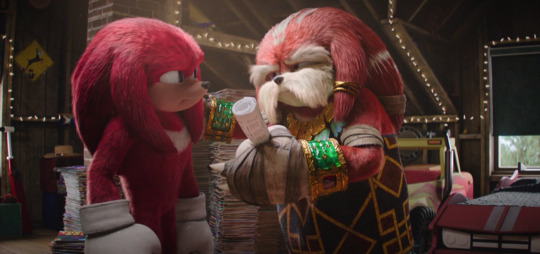
There is no acceptance or acknowledgement of the fact that the clan's current situation is the result of a bloody feud and the destruction of an entire race besides their own. There is also, unsettlingly, no acknowledgement of Tails, Sonic, or The Wachowskis as members of Knuckles' clan.
While there are questionable elements to Pachacamac's approach, his motivations are at least understandable. Knuckles is a minority– the last of his tribe and the only surviving member of his species, so of course his old chief wants to see their traditions and culture preserved.
Things only get really weird when Pachacamac takes hold of Wade– Knuckles' apprentice and the soon-to-be new addition to their clan–and rewrites history. Rather than the tale of a lone owl that the echidnas hunted down in a quest for power, the story is instead of an entire flock of owls that were the aggressors, killing off Knuckles' tribe and burning down his village for no reason other than for the sake of the slaughter.



Similarly, Knuckles isn't described as a lost child left behind, but a fellow warrior who battled alongside his father until the bitter end.


So, knowing that Pachacamac's version of events is wrought with lies leads to one very serious question: What is the true story of Knuckles' battle with Iblis? If there's one thing we know about The Echidna Clan, it's that they are fixated on raw power. They're a warrior-focused society where the best fighter gets the highest honor and the most privileges. They were the ones who crafted The Master Emerald from the seven chaos emeralds. They were the ones who tracked down Sonic when he was a child with the intention of obtaining his power, before Long Claw wiped them out in her final struggle.
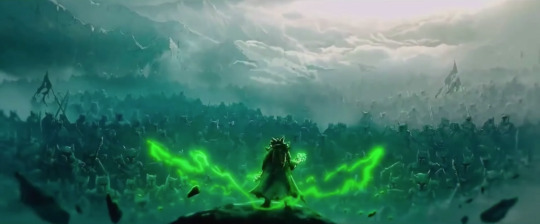

And who else do we know that was accidentally unleashed in a reckless pursuit of power?

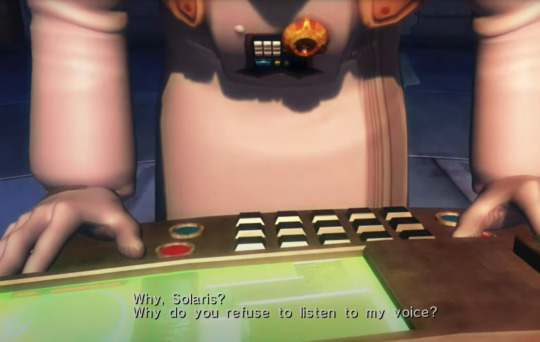
Iblis, the raw power of the sun god Solaris. Iblis, who was sealed away within a child using the power of the chaos emeralds.
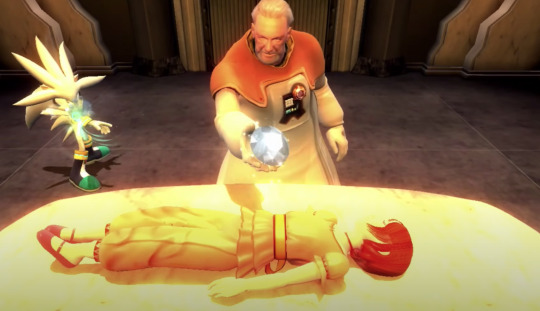
Now, there's no doubt that "The Flames of Disaster" in the SCU are very different from "The Flames of Disaster" in Sonic 06. In the movie universe the flames are merely a type of wieldable power rather than the name of an apocalyptic event. However... what better way to rewrite the fact that the echidna tribe nearly caused the end of the world and locked an immortal fire demon within an echidna child, than by pretending that The Flames of Disaster is just an inherent ability Knuckles unlocked through an epic battle?
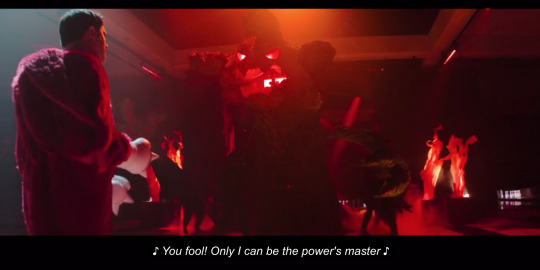

What if "The Flames of Disaster" wasn't a power he obtained through a magnificent fight, but a power he survived after it was thrusted upon him by his elders? ... What if one of the many, many reasons reasons his father didn't let him join the fight was out of fear of what would happen if he cried?
#This theory nuts but that's not going to keep me from seeing it as canon until proven otherwise#Anyways I don't trust that Pachacamac ghost not one bit#Knuckles the echidna#sonic the hedgehog#sonic wachowski#knuckls wachowski#sonic headcanons#knuckles series spoilers#long post
190 notes
·
View notes
Text
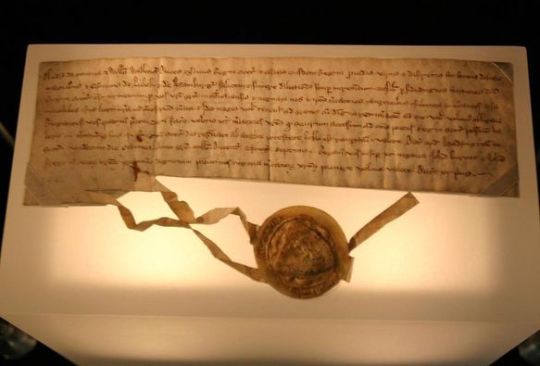
October 11th 1297 was the date of the letter from William Wallace to the mayor of Lübeck.
Today in 1297 a letter from Sir William Wallace and Sir Andrew Moray to the mayors of Lübeck and Hamburg was drawn up, saying that "The Kingdom of Scotland has, by God's Grace, recovered by battle from the power of the English".
This is a remarkable piece of history, and I am honoured to have seen it in person when it was on loan to Scotland a few years ago.
The Lübeck letter was first discovered preserved in the Lübeck archives in the 1820s. It was often mentioned in books thereafter. In 1942, Lübeck, on the Baltic coast of Germany, was attacked by Allied aircraft. As a result, the town's archives, including the letter, were moved to a saltmine for safety. At the end of the war, the Soviet army took the papers east. The archives were later handed over to the archive administration of East Germany, but the medieval documents were not among the records. It was assumed that they had been lost.
In the 1970s Lübeck documents were found in the archives of the USSR. In 1990, after some negotiation, the town's medieval records, including Wallace and Murray's letter, were returned to Lübeck.
There have been calls for the letter to be returned to Scotland, whereas it would be nice to have it to display in one of our museums I think it is as much a piece of Lübeck's history as ours, and also as recipients of the letter it is rightfully there property.
Originally, there were two letters; one to Lübeck and one to Hamburg. The contents were identical and the letters were scribed within a month of the Scots’ success at Stirling Bridge.
The translated letter reads......
"Andrew de Murray and William Wallace, leaders of the army of the kingdom of Scotland, and the community of the same kingdom, to their worthy, discreet and beloved friends the mayors and communes of Lübeck and Hamburg, greeting, and increase always of sincere friendship.
It has been intimated to us by trustworthy merchants of the said kingdom of Scotland that you by your own goodwill are giving counsel, help and favour in all causes and business concerning us and our merchants, although our merits had not deserved this, and therefore all the more are we bound to you to give you thanks and a worthy recompense, to do which we are willing to be obliged to you; and we ask you that you will make it be proclaimed amongst your merchants that they can have secure access to all ports of the kingdom of Scotland with their merchandise since the kingdom of Scotland, thanks be to God, has by arms been recovered from the power of the English. Farewell.
Given at Haddington in Scotland on the 11th day of October in the year of grace one thousand two hundred and ninety seven.
We request moreover that you will see fit to forward the business of John Burnet and John Frere, our merchants, just as you wish us to forward the business of your merchants. Farewell. Given as before."
Significantly, the letter carries the only known impression of William Wallace's personal seal, which shows the Scottish Lion Rampant on the front and on the reverse, a strung bow with a protruding arrow. The inscription appears to read ‘William, son of Alan Wallace’, which is interesting in relation to determining just who Wallace was exactly. An Aleyn Waleys – described as ‘tenant le Roi du counte de Are’ – signed the 1296 ‘Ragman Roll’ and he is quite possibly William Wallace’s father.
Another thing about the letter is the fact that Moray is involved with it, Andrew de Moray was, in the North of Scotland every bit as important as Wallace, history tells us that he was wounded at Stirling Bridge and died of his wounds in November so how involved in this was he?, if I had a time machine I would use it to learn more about Wallace and Moray.
This is a great piece of history and as I said earlier, I would love it to be part of our archives and on display in a museum, but it is the property of the people of Lübeck and we as a nation are grateful that they lend it to us on occasion.
54 notes
·
View notes
Text
Also preserved on our archive (Daily updates!)
An older (published in January 2024) but interesting and comprehensive look at long Covid's effect on Latino families and communities in the US.
By Lygia Navarro and Johanna Bejarano
Editor’s note: This story first appeared on palabra, the digital news site by the National Association of Hispanic Journalists. It is part of a series produced in partnership between palabra and Northwest Public Broadcasting (NWPB) with the collaboration of reporters Lygia Navarro and Johanna Bejarano. *Some people interviewed for this article requested anonymity to discuss private health issues.
Victoria* is already exhausted, and her story hasn’t even begun. It’s late January 2021 in rural Sunnyside, Washington. The town of 16,000 people is a sleepy handful of blocks flecked with pickup trocas, churches on nearly every corner, and the twangs of Clint Black and Vicente Fernández. Geometric emerald chunks of farmland encircle the town.
Thirty-nine-year-old Victoria drags herself back and forth to her parents’ bedroom in a uniform of baggy burgundy sweatpants, scarf, knit hat and mask. Always a mask. As the eldest sibling, her unspoken job is to protect the family. But COVID-19 hits before they can get vaccinated.
When Victoria’s mamá got sick and quickly infected her papá, Victoria quarantined them. She shut them in their room, only cracking the door briefly to slide food in before retreating in a fog of Lysol.
Working in the health field, Victoria knows if they make it through the first 14 days without hospitalization, they will likely survive. Yet, caregiving drains her: Keeping track of fevers. Checking oxygen saturation. Making sure they’re drinking Pedialyte to stay hydrated. Worrying whether they will live or die.
Five days in, COVID comes for Victoria. Hard. Later, when she repeatedly scrutinizes these events, Victoria will wonder if it was the stress that caused it all — and changed her life forever.
At the pandemic’s onset, Victoria’s family’s work dynamics fit the standard in Sunnyside, where 86% of residents are Latino. “Keeping the members of your household safe — it was hard for a lot of families,” Victoria says. Living in multigenerational homes, many adult children, who’d grown up in the United States with access to education, had professional jobs, and switched to working from home. Their immigrant elders, who’d often only been able to finish fourth grade, braved the world to toil in fields, produce packing plants, supermarkets, or delivery trucks. As Leydy Rangel of the UFW Foundation puts it: “You can’t harvest food through Zoom.”
More than three decades ago, when 6-year-old Victoria’s family migrated from rural northern Mexico to this fertile slip of land cradling the zigzagging Yakima River, their futures promised only prosperity and opportunity.
According to oral histories of the Confederated Tribes and Bands of the Yakama Nation — who white colonizers forced out of the Yakima Valley in 1855 — the valley’s fecund lands have fed humans since time immemorial. Soon after the Yakamas’ removal to a nearby reservation, settler agriculture exploded.
By World War II, employers were frantic to hire contracted bracero laborers from Mexico — themselves descendants of Indigenous ancestors — to harvest the valley’s bounty of asparagus, pears, cherries and other cornucopia. This was how Victoria’s family arrived here: her abuelo and his brother had traveled back and forth to Washington as braceros decades before.
Victoria’s path took similar twists, in a 21st century, first-gen way. She moved all over the country for her education and jobs, then returned before the pandemic, bringing a newfound appreciation for the taste of apples freshly plucked from a tree that morning, and for the ambrosial scent of mint and grapes permeating the valley before harvest.
Today, agriculture is the largest industry fueling the Yakima Valley, the country’s twelfth-largest agriculture production area. Here, 77% of the nation’s hops (an essential ingredient in beer) and 70% of the nation’s apples are grown. Latinos, who constitute more than half of Yakima County’s population, power the agricultural industry.
While the area’s agricultural enterprises paid out $1.1 billion in wages in 2020, 59% of the low-wage agriculture jobs are held by undocumented folks and contracted foreign seasonal laborers doing work many Americans spurn. Latinos here live on median incomes that are less than half of white residents’, with 16% of Latinos living in poverty. Also in 2020: as they watched co-workers fall ill and die, Latino farmworkers repeatedly went on strike protesting employers’ refusals to provide paid sick leave, hazard pay and basic COVID protections like social distancing, gloves and masks.
“Every aspect of health care is lacking in the valley,” Yakima Herald-Republic health reporter Santiago Ochoa tells me.
In interview after interview, Yakima Valley residents and health care workers sketch in the details of a dire landscape:
The state’s busiest emergency room. Abrupt shutdowns of hospital facilities. Impoverished people without transportation or internet access for telehealth. Eight-month waits for primary care appointments. Nearly one in five Latinos uninsured. More than half of residents receive Medicaid. Resident physicians cycling in and out, never getting to know their patients. Not enough specialists, resulting in day-long trips for specialized care in bigger cities. With its Latino essential workforce risking their lives to feed their families — and the country — by summer 2020, COVID blazed through Yakima County, which quickly became Washington’s most scorching of hot spots. Not only did Yakima County tally the highest per-capita case rate of all West Coast counties (with Latinos making up 67% versus, 26% for white people), it also saw more cases than the entire state of Oregon. Ask Latinos here about 2020, and they shiver and avert their gazes, the trauma and death still too near.
Their positive tests marked just the beginning of terrifying new journeys as COVID slammed Victoria and many other Yakima Valley Latinos. Mix in scanty rural health care, systemic racism and a complicated emerging illness, and what do you get? Chaos: a population hardest hit by long COVID, but massively untreated, underdiagnosed, and undercounted by the government and medicine itself.
It won’t go away The cough was the first clue something wasn’t right. When Victoria had COVID, she’d coughed a bit. But then, three months later, she started and couldn’t stop.
The Yakima Valley is so starved for physicians that it took five months to see a primary care doctor, who attributed Victoria’s incessant cough to allergies. Victoria tried every antihistamine and decongestant available; some brought relief for three, maybe four weeks, and then returned spasms of the dry, gasping bark. A few minutes apart, all day long. The worst was waking up coughing, at least hourly.
Victoria had chest x-rays. An ear, nose and throat specialist offered surgery on her nose’s deviated septum. As months passed, the black hair framing Victoria’s heart-shaped face started aging rapidly, until it was grayer than her mother’s.
Over a year after the cough began, an allergist prescribed allergy drops, and Victoria made a chilling discovery. Once the drops stopped the cough for a month, then two, Victoria realized that the extreme fatigue she’d thought was sleep deprivation from coughing all night persisted.
“The exhaustion comes from within your soul, it overpowers you,” she says. “It’s intolerable.”
And her mind was foggy. When interrupted at work every 10 minutes by a coughing jag, Victoria hadn’t realized COVID had substantially altered her brain. “There are things in my brain that I should have access to, like words, definitions, memories,” she says. “I know that they’re there but I can’t access them. It’s like a filing cabinet, but I can’t open it.”
Before long, the cough resurfaced. Sometime in 2021, reading COVID news for work, Victoria learned of long COVID: new or lingering health issues persisting at least three months after COVID infection.
How to get help if you think you might have long COVID Talk to your doctor, and if your doctor doesn’t listen to your concerns, bring a loved one to advocate for you at your next appointment. Bring this article (or other materials on long COVID) to show your doctor. Ask your doctor about seeing specialists for long COVID symptoms, such as a cardiologist (for dysautonomia symptoms like dizziness, heart palpitations and shortness of breath), a gastroenterologist (for digestive problems), or a neurologist (for chronic nerve pain). Ask to be referred to a long COVID clinic (if there is one in your area). Now four years into the pandemic, there is still no treatment or cure for long COVID. COVID long-haulers (as they call themselves) have reported over 200 varied symptoms, with fatigue, dizziness, heart palpitations, post-exertion exhaustion, gastrointestinal issues, and brain dysfunction among the most common.
Long COVID is far from a mysterious illness, as it’s often called by the medical establishment and some media. There are precedents: for at least a century, historical documentation has shown that, while most recover, some people remain sick after viral or other illnesses. Yet funds for research have been severely limited, and sufferers ignored. Myalgic Encephalomyelitis – sometimes called Chronic Fatigue Syndrome, or ME/CFS — is a prime example. Like ME/CFS, long COVID afflicts many more women (and people assigned female at birth) than men, with women comprising as many as 80% of COVID long-haulers. Most long-haulers are in their 30s, 40s and 50s — the busiest years for women with children, who often put their own needs last.
What should have been instantly clear, given how disproportionately Black and Brown communities were hit by COVID, was that long COVID would wallop Americans of color. Yet, the U.S. government waited until June 2022 to begin tracking long COVID. Even now, with 18 months of data showing Latinos are the population most impacted by long COVID, palabra is among the very few media outlets to report this fact. Are the nation and the medical community willfully ignoring Latino long-haulers — after sending them into clouds of coronavirus to keep society’s privileged safe?
Fighting for a diagnosis When Victoria mentioned long COVID, her doctor didn’t exactly ignore her: she listened, said “OK,” but never engaged on the topic. Same with Victoria’s allergist and the ear, nose and throat specialist. All they could do, the doctors said, was treat her symptoms.
“I’m highly educated and I know that you have to be your own advocate. But I kept asking, kept going on that line of thought, and they had nothing to say to me. Absolutely nothing,” she laments.
Victoria understood science on long COVID was limited, but still expected more. “All of the treatments we tried, it was as if COVID hadn’t existed. They should at least say that we need to investigate more, not continue acting like it wasn’t a factor. That was what was most frustrating.”
Just as Victoria fought to have her illness validated by doctors, 30 miles away in the northern Yakima Valley town of Moxee, 52-year-old María* waged a parallel battle. Both felt utterly alone.
When the pandemic began, María became the protector of her husband and children, all asthmatics. When she fell ill New Year’s Day 2021, she locked herself in her room, emerging weeks later to find her life unrecognizable.
Recounting her struggles, María reads deliberately from notes, holding back tears, then pushes her reading glasses atop her head. (María moved here from northern Mexico as an adult, and feels most comfortable in Spanish.) Her dyed brown hair, gold necklace and lightly made-up face project convivial warmth, but something intangible behind her expression belies a depth of grief María refuses to let escape. When I tell her I also have long COVID, and fell ill the exact same month, she breathes out some of her anxiety.
María’s long COVID includes chronic, full-body pain; memory lapses so severe she sometimes can’t remember if she’s eaten breakfast; such low energy that she’s constantly like a battery out of juice; unending shortness of breath; joint inflammation; and blood flow issues that leave her hands a deep purple. (The only time María ventured to the hospital, for her purple hands, she says staff attempted to clean them, thinking it was paint.) Like Victoria, María used to enjoy exercise and hiking in the valley’s foothills, but can do neither anymore.
María has no insurance, and receives care at the Yakima Valley Farm Workers Clinic, created in 1978 out of the farmworkers’ movement. The clinic’s multiple locations are the valley’s main providers of care irrespective of patients’ ability to pay.
Whereas Victoria’s doctors expressed indifference to the idea of COVID causing her health complaints, María’s doctors not only discounted this connection, but made serious errors of misdiagnosis.
“Every week I went to see my doctor. She got so stressed out (at not knowing what was wrong with me) that she stressed me out,” María says. “My doctor told me, ‘You know what? I think you have multiple sclerosis.’” María saw specialists, and afterwards, even without confirmation, María says her doctor still insisted she had MS. “I told her, ‘No. No, I don’t have multiple sclerosis. It’s COVID. This happened after COVID.’ I was really, really, really, really, really, really insistent on telling them that all of this was after COVID.”
Latinos uncovering the connections between their ill health and COVID is rare, partially due to the plummet in COVID coverage on Spanish-language news, says Monica Verduzco-Gutierrez, a long-hauler and head of the University of Texas Health Science Center San Antonio long COVID clinic. There has been no national public education on long COVID, in any language.
“It’s hard for people to understand what the real impact of long COVID is now and in the future,” says Lilián Bravo, Yakima Health District director of public health partnerships and the face of COVID updates on Yakima Valley television early in the pandemic. “We’re looking at a huge deficit in terms of people’s quality of life and ‘productivity.’”
Eventually, María’s doctor sent her to another specialist, who said that if she didn’t improve within a month, he’d operate on her hip. María’s never had hip problems. “He said, ‘Well, I don’t know what you’re going to do,’” and then put her on a strong steroid medication that made her vomit horribly, María says. She hasn’t tallied what she’s spent on medical bills, but after paying $1,548 for a single test, it must be many thousands of dollars.
Meanwhile, María’s family and friends kept insisting her maladies were psychological. “I never accepted that. I told them: ‘It’s not in my head. It’s in my body.’” It wasn’t until more than a year after becoming ill that María finally saw a rheumatologist who diagnosed her with long COVID and other immune dysfunctions. “I told her, ‘Yes, I knew that my body wasn’t working. I knew that something was wrong.’ I felt like I could relax. Finally someone is telling me that it’s not all in my head.” Once María was diagnosed, her extended family switched to asking how she was feeling and sympathizing with her.
Victoria, on the other hand, has never received a long COVID diagnosis. At Victoria’s request, her doctor referred her to the state’s only long COVID clinic, at the University of Washington in Seattle, but Victoria’s insurance, Kaiser Permanente, refused to pre-approve the visit — and the clinic wouldn’t accept cash from her. At present, the clinic isn’t even accepting patients from the Yakima Valley or any other part of Washington — they are only accepting patients in King County, which includes Seattle.
Victoria’s family hasn’t accepted her health struggles either. “I’d say, ‘I know that you think I’m crazy,’” Victoria says, chuckling, as she often does to lighten her discomfort. “My mom would fight with me: ‘You forgot to do this! Why are you so spacey?’ ‘Mami, it’s not that I forgot. In reality, I completely lost track of it.’” If Victoria is fatigued, her family asks how that’s possible after a full night’s sleep. “I’ve found that I have to defend myself. When I try to explain to people, they hear it as excuses from a lazy person — especially being Latinos.”
Karla Monterroso, a 42-year-old California Latina long-hauler since March 2020 who spent her first year bedbound, says, “(With long COVID), we have to rest in a way that, in our culture, is very difficult to achieve. We really judge exhaustion.” In fact, pushing physically or mentally for work can make long-haulers much sicker. Karla says Latino ethics of hard work like those of Victoria’s parents “aren’t the principles that are going to serve us with this illness.”
Long COVID diagnoses in Latinos are still too rare, due to untrained family medicine physicians and medical stereotypes, says Verduzco-Gutierrez. (Doctors might see blood sugar changes, for example, and assume that’s just because of Latinos’ high rates of diabetes, rather than long COVID.) She says “misinformation on long COVID” is rampant, with physicians claiming long COVID is a fad, or misdiagnosing the bone-deep exhaustion as depression. When Verduzco-Gutierrez’s own doctor invited her to speak to their practice, the assembled physicians weren’t aware of basic research, including that the drugs Paxlovid and Metformin can help prevent long COVID if taken at infection. In Washington, physicians must complete training on suicide, which takes 1,200 to 1,300 lives in the state yearly, but there’s no state-wide training on long COVID, which currently affects at least 498,290 Washingtonians.
Cultural skepticism about medicine — and entrenched stigmas about illness and disability — mean Sunnyside conversations about aftereffects don’t mention COVID itself. Victoria’s relatives push traditional herbal remedios, assuming that anyone still sick isn’t doing enough to recover. “(People suffering) feel like they’re complaining too much if they try to talk about it,” Victoria says. Meanwhile, her parents and others in her community avoid doctors out of stubbornness and mistrust, she says, “until they’re bleeding, when they’re super in pain…, when it’s gotten to the worst that they can handle.”
“People in this community use their bodies for work,” Victoria says. “If you’re Latino, you’re a hard worker. Period,” says Bravo. “What’s the opposite of that, if you’re not a hard worker? What are you? People don’t want to say, ‘I came to this country to work and all of a sudden I can’t anymore.’”
Victoria sees this with her parents, who’ve worked since the age of 10. Both have health issues inhibiting their lives since having COVID — her dad can’t take his daily hour-long walks anymore because of heart palpitations and shortness of breath, and her mom began getting headaches and saw her arthritis worsen dramatically — yet neither will admit they have long COVID. Nor will their friends and family. “If they noticed the patterns of what they themselves are saying and what their friends of the same age are suffering after COVID,” Victoria says of her community, “they’d hear that almost everyone is suffering some type of long COVID.”
Long COVID’s deep impact on Latinos The “back to normal” ethos is most obvious in the absence of long COVID messaging while as many as 41 million adults now have — or have recovered from — long COVID nationwide. “The way that we’re talking about the pandemic is delegitimizing some of (long COVID’s) real impacts,” says Bravo of the Yakima Health District.
Even with limited demographic data, statistics show a nationwide reality similar to Victoria’s Sunnyside. Through a recurring survey, the Census Bureau estimates that 36% of Latinos nationally have had long COVID — likely a vast underestimate, given that the survey takes 20 minutes to complete online (Latinos have lower rates of broadband internet), and reaches only a sliver of the U.S. population. Experts like Verduzo-Gutierrez believe that true rates of long COVID in Latinos are higher than any reported statistic. California long-hauler Karla Monterroso agrees: “We are underdiagnosed by a severe amount. I do not believe the numbers.”
This fall, a UC Berkeley study reported that 62% of a group of infected California farmworkers developed long COVID. Weeks later, a survey from the University of Washington’s Latino Center for Health found that, of a sample group of 1,546 Washington Latinos, 41% of those infected became long-haulers. The Washington results may also be an undercount: many long-haulers wouldn’t have the energy or brain clarity to complete the 12-page survey, which was mailed to patients who’d seen their doctor within the prior six months. Meanwhile, many long-haulers stop seeing doctors after tiring of the effort and cost with no answers.
“Our community has not bounced back,” says Angie Hinojos, executive director of Centro Cultural Mexicano, which has distributed $29 million in rent assistance in Washington and hasn’t seen need wane. “That is going to affect our earning potential for generations.” The United Farm Workers’ philanthropic sister organization, the UFW Foundation, says union organizers hear about long COVID, and how it’s keeping people out of work, frequently.
Cultural and linguistic disconnects abound between doctors and Latinos on long COVID symptoms, some of which, like brain fog and fatigue, are nebulous. If doctors lack patient rapport — or don’t speak their language — they’ll miss what patients aren’t sharing about how long COVID changed their lives, work and relationships. That’s if Latinos actually go to the doctor.
“If you’re working in the orchards and your muscles are always sore, it’s just part of the day-to-day reality,” says Jesús Hernández, chief executive officer of Family Health Centers in north-central Washington. “If you’re constantly being exposed to dust and even chemicals in the work environment, it’s easy to just say, ‘Well, that’s just because of this or that,’ and not necessarily be readily willing to consider that this is something as unique as long COVID.”
Even Victoria says if not for the cough, she wouldn’t have sought medical advice for her fatigue. “There are a lot of people out there that are really tired, in a lot of pain and have no idea why. None,” says Karla, who was a nonprofit CEO when she became sick. “I have heard in the last three-and-a-half years the most racist and fatphobic things I have ever heard in my life. Like, ‘Oh, sometimes you got to lay off the beans and rice.’ I have a college education. I’m an executive. I am in the top 10% of wage earners in my community. If this is my experience, what is happening to the rest of my people?”
Conspiracy theories and misinformation As Yakima Valley’s Latino vaccination rates continue dropping, I hear all the COVID conspiracy theories: the vaccine has a chip that’ll track you; the vaccine makes you and your children infertile; COVID tests are rigged to all be positive; that hospitals get paid more for COVID patients. Victoria laughs at the most absurd one she’s heard. Her mom’s explanation for her health problems nearly three years after COVID: the vaccine.
Across the Latino United States, social media algorithms and WhatsApp threads promoting COVID disinformation proliferate. Last summer, Latino Center for Health co-director Dr. Leo Morales did a long COVID community presentation just south of Yakima Valley. The audience’s first question: Are vaccines safe? “This is where we’re still at,” Morales says. “That’ll be a big stumbling block for people…in terms of getting to talking about long COVID.”
One morning in early November, Morales and his team gather in Toppenish at Heritage University, where 69% of students are Latino, to present their survey data. Neither presenters nor attendees wear masks, an essential tool for preventing COVID transmission and long COVID. “The only conversation that I’m having about COVID is in this room,” says María Sigüenza, executive director of the Washington State Commission on Hispanic Affairs.
Yakima Valley health institutions are also ignoring long COVID. Of the two main hospital systems, Astria Health declines interview requests and MultiCare reports that of 325,491 patients seen between January and November 2023, 112 — or 0.03% — were diagnosed with long COVID. The Yakima Valley Farmworkers Clinic, where María’s doctor works, refuses to let me speak to anyone about long COVID, despite providing patient information for the Latino Center for Health’s survey. Their doctors simply aren’t seeing long COVID, the clinic claims. Same with the other main community provider, Yakima Neighborhood Health Services, whose media officer responds to my interview requests with: “It’s not going to happen.”
“I think they’re not asking, they’re not looking,” Verduzco-Gutierrez says. “Do the doctors just…look at your diabetes or your blood pressure, but not ask you, ‘Did your diabetes get worse when you had COVID? Did your blood pressure get worse? Did you not have blood pressure problems before? And now do you get dizzy? Do you get headaches? Do you have pains?’” She believes that many, if not most, Latinos with long COVID aren’t getting care, whom she calls “the ones that we’re missing.”
An uncertain future The outlook for Latinos with long COVID is grim. Cultural stigma and ableism cause now-disabled long-haulers to feel shame. (Ableism is societal prejudice and discrimination against disabled people.) Disability benefits are nearly impossible to get. Long-haulers are losing their homes, jobs and insurance. Latinos’ overrepresentation in sectors that don’t offer sick pay and are heavily physical — cleaning, service, agriculture, construction, manufacturing, homecare and healthcare among them — may automatically put them at higher long COVID risk, given ample anecdotal evidence that pushing through a COVID infection instead of resting can lead to long COVID. Latino care providers will become ill in greater numbers, imperiling the healthcare industry.
But Latinos may not be clear on these factors, says long-hauler Karla Monterroso. “My tío had said…'We must be defective because we get sick more than the white people.’ And I’m like ‘No, tío. We are exposed to the illness more. There’s nothing defective about our bodies.’ I’m afraid for us. It’s just going to be disability after disability after disability. We have to start in our small communities building caring infrastructure so that we can help each other. I am clear: No one is coming to save us. We’ve got to save us.”
Disability justice advocates worry about systems unable to cope with inevitable disabling waves of COVID in the future. “(Latinos) aren’t taking it as serious as they should,” says Mayra Colazo, executive director of Central Washington Disability Resources. “They’re not protecting each other. They’re not protecting themselves.” Karla sees the psychology behind this denial: “I have thought a lot about how much it takes to put yourself in danger every single day. (You have) to say ‘Oh, it’s fine. People are exaggerating,’ or you get that you’re in existential hell all of the time.”
Reinfection brings additional risk of long COVID, research shows, and Verduzco-Gutierrez says, “We still don’t know the impact of what is going to happen with all these reinfections. Is it going to cause more autoimmune disease? Is it going to be causing more dementia? Is it going to be causing more cancer?” She believes that every medical chart should include a COVID history, to guide doctors to look for the right clues.
“If we were to be lucky enough to capture everybody who has long COVID, we would overwhelm our (health) system and not be able to do anything for them,” Victoria says. “What’s the motivation for the medical field, for practitioners to find all those people?” For now, Victoria sees none. “And until that changes, I don’t think we will (properly count Latino long-haulers),” she adds.
Flashes of hope do exist. In September 2023, the federal government granted $5 million each to multiple long COVID clinics, including three with Latino-specific projects. In New York City, Mt. Sinai Hospital will soon open a new long COVID clinic near largely-Latino East Harlem, embedded in a primary care clinic with staff from the community to reach Latino long-haulers. Verduzco-Gutierrez’s San Antonio clinic will teach primary care providers across largely rural, Latino South Texas to conduct 15-minute low-tech long COVID examinations (the protocol for which is still being devised), and will deploy community tools to educate Latinos on long COVID.
Meanwhile, at the University of Washington long COVID clinic, staff are preparing a patient handbook, which will be adapted for Latinos and then translated into Spanish. They will also train primary care physicians to be local long COVID experts, and will return to treating patients from the whole state rather than just the county containing Seattle. After palabra’s inquiry, the UFW Foundation now has plans to survey United Farm Workers members to gauge long COVID pervasiveness, so the Foundation can lobby legislators and other decision makers to improve Latino long-hauler care.
Back at the Yakima Valley survey presentation, attendees brainstorm new care models: Adding long COVID screening to pediatric checkups, given that long COVID most impacts child-bearing-age women, so moms can bring information to their families and community. Using accessible language for long COVID messaging, or, as Heritage University nursing faculty member Genevieve Aguilar puts it: “How would I talk to my tía, how would I talk to my abuelita? If they can understand me, we’re good to go. If they can’t, olvídate. We have to reframe.”
More than anything, personal narratives will be the key to open people’s minds about long COVID — although that path may be challenging. In Los Angeles, Karla has dealt with a lack of full family and community support, in part, she believes, because her body represents COVID. “I am living, breathing proof of a pandemic no one wants to admit is still happening, and that there is no cure for what I have. That is a really scary possibility.”
While Karla does identify as disabled, Victoria and María don’t. Victoria has learned to live and move within her physical limits. At work, she sometimes feels inhibited by her cognitive issues. “I tell my boss all the time, ‘Oh man, you guys hired such a smart person. But what you got was after COVID, so it’s not the same.’” At times, she worries about the trajectory of her career, about how her work’s intense problem-solving wears out her brain. Will she be able to pursue larger challenges in work in the future? Or will long COVID ultimately make her fail?
Victoria tells me she “remains hopeful that there is a solution.” In a surprising twist, her cough completely disappeared eight months ago — when she became pregnant. (Other long-haulers have seen their symptoms improve with pregnancy, as well, likely due to immune system changes allowing a pregnant person’s body to not reject their baby’s growing cells). Victoria is optimistic that her other symptoms might disappear after she gives birth. And that, maybe someday, her parents will admit they have long COVID, too.
#long covid#covid 19#mask up#covid#pandemic#public health#wear a mask#still coviding#wear a respirator#coronavirus#sars cov 2#covid conscious#covid is airborne#covidー19#covid isn't over#covid pandemic#covid19
43 notes
·
View notes
Note
So the test wasn't able to be performed during the actual coupe, I don't think, but the Jade Emperor's surrender only serves to incite the court even more. After the coup, they DEFINITELY want that test done once its over, and they aren't going to take no for an answer no matter what their emperor says. Partially because he himself wants to know, for certain, if Azure's claim is true and also because of the sheer amount of stress the Celestial Court being in such chaos and disarray, all centered on him, was causing him. Wukong basically goes, "Alright, if it will make you happy and get you off my tail!" nd marches right into that council chamber to perform a test to his dao and compare it to some of the remaining bits of dao of Sonzi left in storage somewhere expressly for the purpose the verifying any heirs fully expecting it to be complete bullshit dreamt up by one of Azure's delusions... and it comes out as a positive match. And since Guanyin is already confirmed as Sonzi's reincarnation, that could only make Wukong a decendant.
Wukong is floored by the revelation because now he can't deny it and has to accept that he is somehow related to the Jade Emperor. His first reaction is to look up at his newly discovered grandfather and, quietly, ask (more like accuse) him if he had always known and ask why he hadn't told him.
See, what everyone except for Macaque had never known was that Wukong's lack of knowledge of his family history, not knowing his origins or his family, had always been a sore point for him. He'd always wanted to know who he was and where he came from... but was forced to accept that he would never truly know as the centuries pass. And now he if finally told that information was kept form him, perhaps to protect him, but he lacks the context to know that the person who had kept ot form him had only jsut found out themselves.
Prev.
It would be ultimately the pressure from the Celestial and Underworld courts after the coup that force the royal couple and Wukong to come forward with a Dao test. A simple but uncomfortable procedure performed by the Ten Kings taking a sample of Dao from both Wukong, Guanyin, and from a preserved item of Songzi. The test is done publically so the results can't be fudged.
The sheer indignation on Wukong's face when the Dao test comes out a match is immense. Excuse him?! How dare that be true!? Why didn't anyone tell him!?
Wukong: "This has to be a mistake!! I can be a celestial prince! I can't let Xiaotian be mixed up in all of this!!" Macaque: "Peaches, the only way this test could have a false negative is if you took a bite out of the Princess herself. And she's been gone since before the Heavenly Pillar collapsed."
Macaque was the one person Wukong told about his insecurity regarding his family (or lack-there-of). Something that Macaque himself understood and sympathised with, sharing his own origin of being found alone on the moon's surface by his sister. It was something that helped them bond in a way they couldn't with other demons who had families and known ancestors.
And of course now everyone is convinced that Wukong's induction as a Peach Orchard Attendant and his Havoc were the result of a failed coming-out party for the Emperor's grandson. Why else would some random monkey get a job so close to the Emperor's daughters? (ty @soniclozdplovesonic for the idea)
And when evidence of The Stone Matriarch/Shíhuā on Flower Fruit Mountain becomes public, along with the evidence that she pretty much gift-wrapped the Stone Palace for her child, it only convinces the Three Realms even more that Wukong's story was one of a lost heir that was cruelly rejected by his subjects.
The monkeys of FFM (The Stalwarts and those who moved to the mainland) instead argue that no matter the spiritual connection between Wukong and the Celestial Royal Family, he's still their King and rightful Heir to Shíhuā's throne, not the Jade Emperor.
Havoc in Heaven Part 2 is still ongoing with all the political unrest.
By the end of the day, Wukong just wants to cuddle his mate and his baby. Once Macaque takes a shower of course - he's been mucking the stables the last couple of weeks.
#century stone egg au#stone matriarch au#sun wukong#six eared macaque#liu er mihou#shadowpeach#lmk jade emperor#lmk#lmk aus#lego monkie kid
56 notes
·
View notes
Text
BRF Reading - 21st of July, 2024
This is speculation only
Cards drawn on the 21st of July, 2024
Question: How is The King's health?

Interpretation: Not good :(
Card One: The Ten of Pentacles
This is a nice card to start of a reading. The 10 of Pentacles is about family and legacy, what you leave to future generations. it's about stability, traditions, what you inherit, privilege, affluence, and it is one of the cards that can be used for the BRF.
The energy of this card is of thinking things over and making some small decisions. The King if thinking of his family, his family's history, what his legacy will be, and how to preserve that history and legacy for future generations. He may be updating his will and considering what he has to leave and who he wants to pass it to (bearing in mind that AFAIK everything will go to the next monarch to avoid death duties and then it will be gifted to the intended recipients). There is an emphasis on legacy in the energy of this card - The King is having a good look at his legacy so far and a good think about what he wants as his legacy and how he can achieve that. It is an energy of planning for the future, when he will no longer be around, and also what will be said about him in history books.
The Ten of Pentacles can be a card of family, and here it indicates that The King has (most of) his family around him and supporting him, which is nice to see.
Card Two: The Page of Pentacles
This is my card for the UK. It has a similar energy to the card before it - that of planning and preparing. The King is thinking of the UK, and what he wants to do for it as King, and he is taking a few small, careful steps to make that happen.
Both this card and the one before it are Pentacles, and Pentacles is the slowest suit of the Tarot. There will be lots of thinking and discussing with others and mulling it over before The King takes any action in these areas, and when he does take action it will be slow, careful, and considered.
This is the card of the student, so The King could be studying something very carefully before he makes a decision about it. He wants to learn from what he sees as past mistakes and not repeat them.
Pages are messengers, upright is good news, and Pentacles is the suit of money/titles/status/material things, so he may be thinking over something in that area and slowly composing a message about it. If so, the message will be good news, not bad news.
Pages are children, so this could be about the hole in the next generation of working royals caused by the defection of his son.
Card Three: Death in Reverse
So far, the energy of this reading has been nice - settled, calm, preparing for the future in a slow and diligent way. This card is where that stops. The Death card has the strongest energy of all the cards of the reading and its energy is not good at all. It's sitting there on the end and the energy is tolling through the reading like a bell of doom.
Death is the card of Scorpio. Here it represents The King, who is a sun sign Scorpio. In the reverse, in answer to a question about his health, it is not a good sign. The King's health is in shadow, reversed, weakened. The best interpretation is that things are at a standstill - there is no change. The worst interpretation is that things are slowly going downhill. In either case, there is no indication that The King will be able to get back to his old level of health.
Death is a card of change and transformation. In the reverse, there is no change. It is a card of stagnation, repeated negative patterns, and decay.
The energy of this card is of someone who is not getting better. Whatever state of health The King is in now, that is it. There is no change, no progression towards more healing. This is as good as it is going to get for The King, unless something happens to move the healing forward. In the absence of that push, the energy is of a state of inertia that will change to a decline of health. If The King knows this, then this explains why he is doing so many tours and events - he knows his time is more limited than what he thought and he wants to get everything done that he can within that shortened time frame.
Underlying Energy: The Eight of Cups in Reverse
The Eight of Cups is a card of grief, mourning, and moving on, walking away from something. In the reverse, you can't walk away - you are stuck. In the reverse, it indicates stagnation, accepting less than 100%, and staying in a bad situation.
The energy of this card is of resignation. The King is stuck with his current state of health. If it doesn't improve then there is nothing he can do about it. Instead, he is accepting that he is at less than 100% health and making the most of what he can do within that situation.
The suit of this card is Cups, which is about emotions, so I think The King is quite emotional about his state of health and how it has changed his plans for the future.
The card shows Psyche descending into the underworld, leaving her worldly goods behind her. This is, of course, a metaphor for death. The good news is that with the card in reverse, this is not happening just yet (unless something very unexpected happens). Cards in the reverse can sometimes indicate a delay before the event occurs, and that is the energy I am getting from this image. The descent to the underworld will happen, it is closer than The King would like it to be, but - not yet. It is not yet the time for this to happen.
Suits: Major arcana for Scorpio, a water sign, Cups = water = emotions, and Pentacles = earth = material things. Emotions and material things. Timing wise, Pentacles is the slowest suite of the Tarot and represents years, Cups are the next slowest and represents months.
Conclusion:
The King is as well now as he will ever be. He is not at death's door, but neither is he in the pink of health He is concerned about his legacy, how he will be seen by the history books, what he is passing on to his descendants, and what he wants to do for the UK. He may be quite emotional about the state of his health and what it means for his plans for his reign.
The King is in a state of health where nothing is changing, for good or bad. He can use this time to do the things he wants to do, before his health becomes worse. His health will decline, but that decline is not here quite yet. He has this pocket of time (which could be months or years) to do the things he wants to do and to prepare for the future.
52 notes
·
View notes
Text
Some Miss Hecate-related Observations about the Pendog Creative Library
Hello you!! So for a while I've been keeping my eyes on this arg! The website has finally launched and I implore you to go take a gander yourself, and even support @withkindereyes and @pendogpuppets!!
okay now let's get into the nitty gritty
Rambling under the cut cause this might be a long one lmao
Miss Hecate. Missy Prissy Hecate.
Out of the characters in the PCL, Hecate here is the one we know the least about, we don't know when she was created, just that she predates Maisy the Mutt (1930's), and any media we have of her is either defaced or a lucky find with strange circumstances.
About The Artists
In almost all of the submissions about Hecate in the Library, the artists are either missing, dead, or unlisted.
Dan Hook & Milton Crane, the artist and writer behind the storybook both have little to no work before the Hecate Storybook and seemed to disappear without a trace.

Robert Webber, the painter behind "Hecate Painting" describes a strange experience that happened just before painting the piece and is listed as having gone missing on the eve of his 75th birthday.
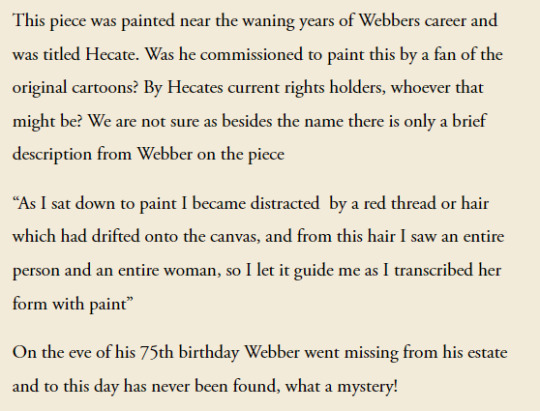
Nathan Bery, the artist behind "Woman in her Thoughts" describes a dream he had that inspired the painting. It is not listed what happened to Nathan but he is referred to in the past tense.

Milford Sykes, the painter behind "Unnamed Work", the piece was only found after his death among his finished works but is the only one that appears to be finished.

There is no artist listed behind Miss Hecate's model sheet, the copyright is blotched out with ink. All we can garner is that this was produced in 1950 and may be one of many model sheets as it's listed as "#28."
This happens again in "Hecate Drawing," as it was received by an anonymous donor who simply claimed it was relevant to the PCL's search for Hecate-related media.
No artist is listed once again for the Hecate Cigarettes ad and it is listed that no artistic depictions of her exist before the 1950s. I tried to identify the font used but if any of you happen to know what it is or if it's a custom font, do tell!!

Image retrieved from the PCL
Ick@ck and the FoundFinders
Ick@ck and the FoundFinders worked with the Pendog Library in restoring and preserving what media they could find of all these characters, there used to be a link for their site but was removed due to an incident we will be discussing later on.
In the Museum Trip update we finally get some more mention about Hecate and how the R.W Winfield Library (presumably anyway) had some information about her. Presumably these were added to the site and then an update where the site was having issues but were promptly fixed for an unknown reason.
"But John!! What's the deal with Hecate and Ick@ack??" I hear you ask? Well, in the description for "Hecate Drawing," where there would be an artist listed and a bit of history on the before and after of said artist. It simply takes a turn into honoring Ick@ck, pointing out how he was a huge fan of Miss Hecate and went to great lengths on finding any media he could alongside FoundFinders about Hecate.
What happened? Well you see, in the update "Exciting News!" Penny M states that Ick@ck and co have managed to recover a lost tape of an original Hecate cartoon, presumably dating many artistic renditions in or after 1950. The team decided to host a party for such a find and to watch the tape, however in the update "Halloween" Penny M was unable to attend the party due to a sickness. In the next updates "Emergency," and "Hiatus", we get some detail on what happened.
On October 31, 2023(?), Ick@ck and several of his friends died under circumstances that were not disclosed to the public. Rumors and speculation have presumably gone around about what happened but Penny M did not wish to share for the sake of not giving these rumors any weight.
Miss Hecate
While we know very little about Miss Hecate herself, the circumstances surrounding her media and what little we can find of her seem to result in strange or terrifying things happening. All the artists past 1950 who either died, went missing, or are undocumented all together, Ick@ck's death.
Her profile especially is very different from the rest. While everyone else has proper profile pictures and even some file to showcase their voices, Hecate's profile is the only one that's disturbed.
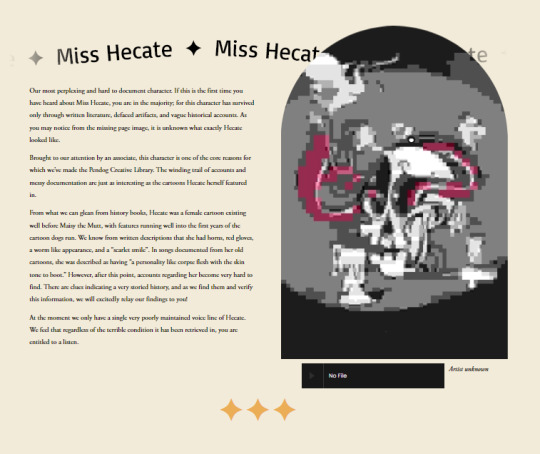
With the heavily compressed illustration of her, to the mentioning of the poor condition of her voice line (and the lack of a file but that might be a mistake), and everything else.
Yeah it's kind of a no-brainer, something's up with this lady but realistically, we'd have to wait. Which I personally am more than happy to do!!
If you've got your own theories or observations, feel free to put them down below in the reblogs!!
#oh god this ended up being far longer than i anticipated i think i'm going to be sick [half-joking]#Normally I wait for other people to make stuff like this but I wanted to give it a crack for once#I think i did pretty decently--decent enough I guess#idk I was never very good with args--i prefer to just sit back and look at everything from afar but Miss Hecate fascinates me so very much#I CAN'T GET HER OUT OF MY HEAD it's so over chat it was nice knowing you all/j#pendog creative library#pcl#others art#others ocs#alternate reality game#links#worms...#pyro screams to the abyss
34 notes
·
View notes
Text
why are we all pretending Katniss was the most reliable narrator when Haymitch was concerned? Because, when there’s so many people upset by the prospect of getting a book from his perspective, one would assume we already have enough information in that front. That we don’t need more content about him because we already got too much…BUT WE DIDN’T! We know close to nothing about what actually happened with him during and after his games…we only know what Katniss does, and even her knowledge isn’t enough to build a thrust-worthy narrative, since everything she got was just what Haymitch allowed her to; which, knowing his highly self preserved personality and Katniss’s not being the most perceptive person in the planet to figure out stuff by herself, it wasn’t even close to enough
“ow but we already have a book from the tribute perspective, everything will be too repetitive…”
No, it won’t! Because Haymitch wasn’t only a victor…he was a Quartel Quell Victor! He was sixteen years old when he was sent to an Arena with the double of the tributes! He went there with a childhood friend and other three children he knew from town! He won his edition by calculating the use of a fucking force field cause he wanted to go back to his family and his girl only to survive and see that his actions resulted in the death of the people he most loved….there is nothing to do with Katniss’s history -as her mentor, Haymitch made sure that she didn’t have to go through what he did- so let’s stop pretending they are the same person just because they have similar personalities and the same habits of annoying Snow..
“but i was expecting Plutarch because Suzanne said SOTR was about propaganda and i don’t see how she will be able to fit Haymitch into this narrative…”
How not???? Haymitch was the mastermind behind Katniss and Peeta’s winning. He was the one who planed the entire star-crossing-lovers approach. He was the one who got into Katniss’s head by sending her sponsor parachutes just to make her act a certain way because he knew the Capitol would burst in excitement….He was the one who, when none of the other members of the Mockingjay team -including Plutarch- knew how to make Katniss act more convincing for the propos, directed the whole thing because he knew how to make her get through the Capitolities….Haymitch was the strategist. He knew how to work with the city, he was the propaganda!
Do you really things Suzanne won’t find a way to show us how little Haymitch played with his odds during his interview and training? Do you things she can’t show us how he had learnt to, so effectively, play the Capitol, and make this interesting? That she can’t surprise us? Who’d you take her from? really..
PS: You’re also not obligate to read the book, guys. Suzanne Collins made this one because she wanted to send a message, if you are not interested to read it, just don’t! No one is forcing you to. But there is no need to rave and hate everything just because you disagree with her way of executing it… I agree it would be nice to have a book about Plutarch and how he planed the revolution for all those years, and maybe we get one someday…but this one isn’t about it and it doesn’t mean it will be any less important
#sorry about the rant but i had to#sunrise at the reaping#thg sotr#katniss everdeen#peeta mellark#plutarch heavensbee#thg series#the hunger games#suzanne collins#haymitch abernathy
47 notes
·
View notes
Text
You know according to tolkien's legend, the accounts of middle earth came to the author via Hobbits and the manuscripts left behind.
In the eyes of Hobbits elves were is super kind dudes who gave them food and shelter but in context it was only because Bilbo was with Gandalf on a fucking journey to reclaim Erebor and the rest of hobbits were in the main plan to kill literal Satan.
And about the manuscript thing, the relics only survive when they're kept in best condition. Elves were the superior species of middle earth with advance technology so,their version of history could be best preserved.
I'm not saying that all elves where bad or something, What I'm saying is what if the middle earth history has an authorship bias. There are so many instances in which flawed deeds of elves are hidden in flowery language such as Eöl took (unwilling)Aredhel as his wife. How at many instance which you read about Galadriel, in subtext she seems like a power hungry absolutist but her causes are always shown as one of a noble lady fighting for a great cause. Only flawed elves are shown in Silmarillion.
So, what if elves were flawed like the second born and other creatures of Middle earth but they always appeared noble and great due to authorship bias.
And by authorship bias,I don't mean authorship bias by tolkien but if we go according to the myth of middle earth by tolkien,then it's the authorship bias of whoever write the said history of middle earth which tolkien later found and translated. So, it's not Tolkien fault because he's translating what he's given but the fault lies in the hands of whoever wrote the original verses.
Why I'm rambling all these? It's because we were studying about authorship bias and bending of actual events while writing the history. It made of think about the history of middle earth.
#thoughts#the lord of the rings#tolkien lore#tolkien#lord of the rings#the hobbit#hobbit#silmarillion#authors#authorship bias#elrond#galadriel#glorfindel#kili#fili#thorin#thorin oakenshield#legolas#aragorn#merry#pippin#frodo#sam#boromir#faramir#durin#celeborn#celebrimbor#lotr#arwen
322 notes
·
View notes
Text
How to Write Devastating Betrayals (Pt. 1)
Here are some elements + tips on satisfying betrayals that will destroy both your characters AND your readers!
1. Relationship Between Trust and Betrayal
The #1 Betrayal Rule:
MORE TRUST = WORSE BETRAYAL
This is because TRUST implies 2 main things:
The traitor has probably PROVEN their trustworthiness, and now has a shared history + bond with the character they’re betraying
The traitor probably has access to a LOT OF INFORMATION about the character, whether it’s career-wise or personal. Probably at least some information the character considers STRICTLY confidential
An act of betrayal undermines Point 1 by manipulating Point 2 to their advantage.
So, if you want your betrayal to DESTROY, have the traitor be CLOSE with the character they’re about to betray. Lets compare examples:
you are a gang boss. You hire a new recruit who doesn’t really know anything except one insignificant operation, like “today we buy groceries at 2PM”
your recruit tells the rival gang about the grocery trip
→ betrayal doesn’t really matter that much
you probably didn’t place much trust in a new recruit
the implications of information leak are insignificant
→ not much plot weight
On the other hand:
you find out that the entire time, your RIGHT HAND MAN (also your childhood friend!) has been feeding information to the rival gang and sabotaging your operations
→ HURTS a lot more emotionally
might ruin everything you’ve built, career-wise, for good
→ LOTS of plot weight
From a completely SECULAR PLOT STANDPOINT (please don’t come for me, theologians), Judas’ betrayal of Jesus is a good example because:
Judas was one of Jesus’ disciples, a.k.a. the people considered closest to him, and who followed Jesus throughout all of his preaching years
Judas’ information about Jesus’ identity and whereabouts led to Jesus’ crucifixion → LOTS of plot weight (the entire Bible from a Christian standpoint foreshadows this moment, and every point after is spreading word of this moment. Talk about plot implications!)
ONCE AGAIN, I know all the “Jesus knew and allowed it to happen” “it was the will of God” stuff but this is purely used as a good plot example!!!!
2. Reason for Betrayal
“’Cause it’s super edgy/evil/cool” is DEFINITELY not a valid option.
All the plot points in a book build towards achieving a goal, and all the characters do things they think will get them closer to what they want. Likewise, the traitor must want a specific thing that ONLY betrayal can get them, or that betrayal can get them more efficiently.
People generally portray typical traitors as:
completely selfish with no personality trait aside from infinite ambition and ruthless pragmatism
a hero whose had enough
someone who sees the person they betrayed as a “worthless disposable” or something
Traitors don’t have to be morally bankrupt, even though betrayal is typically seen as something inherently bad, or just a bad means to a good end at best.
They can be conflicted about the betrayal (like Macbeth delaying his murder of King Duncan), remorseful about it (like Discord from MLP feeling super guilty after he hands the main protagonists over to the villain), or even do it for the “greater good.”
e.g. Brutus thought Caesar was becoming too power hungry, and would destroy the republic by becoming a dictator, so Brutus betrayed him to preserve the republic
→ example of a betrayal that was NOT self-serving
However, building on the MLP Discord example, a traitor can also have been manipulated into it themselves.
(For context, the villain basically promised Discord lots of power if he handed over the protagonists, but then the villain also sucked away Discord’s powers afterwards—won’t bother explaining MLP magic mechanics LOL)
3. Foreshadow It
A satisfying betrayal is usually a subtle, looming shadow that creeps over your plot before it makes its grand entrance during the scene when the character realizes the traitor sold them out.
A good example is in Shakespeare’s dramatization of Brutus’ betrayal:
Brutus’ loyalty to the REPUBLIC is made super clear throughout. When Caesar starts deviating, seeming more dictatorial, Brutus remains firm.
Their values are CLEARLY conflicting, so SOMETHING has to be done. Either:
they reconcile by both agreeing on either dictatorship or democracy
they turn on each other...and that’s what happens
Basically, planting the possibility in your reader’s mind is a great way to foreshadow a betrayal.
Other ideas could be:
traitor begins suddenly acting a lot warmer to the unsuspecting character, or even colder right BEFORE the betrayal
traitor is always TOO obedient and/or sycophantic
traitor acts suspicious, e.g. caught in lies, using inconsistent body language (ex. pretending to cry when talking about something really bad), caught talking to people they shouldn’t be talking to (e.g. rival gang)
∘₊✧────── ☾☼☽ ──────✧₊∘
instagram: @ grace_should_write
stay tuned for part 2!
Hope this was helpful, and let me know if you have any questions by commenting, re-blogging, or DMing me on IG. Any and all engagement is appreciated <3333
Happy writing, and have a great day!
- grace <3
#writers on tumblr#writing#writing tips#booktok#writer#writeblr#novel#writerslife#writergram#wattpad#betrayal#oc#writing stories#creating characters#characters#fantasy#ya fantasy#ya books#plot holes
304 notes
·
View notes